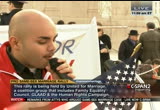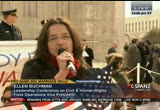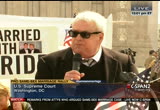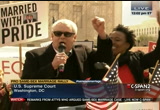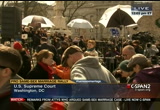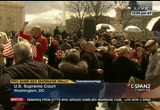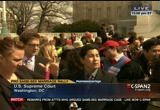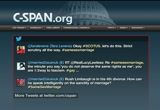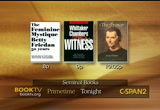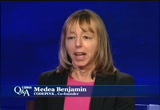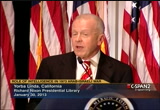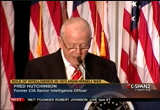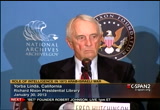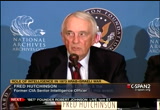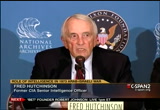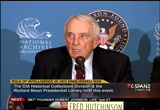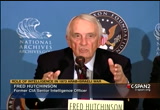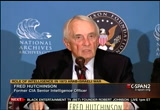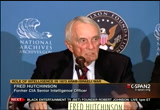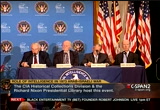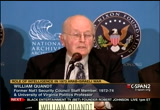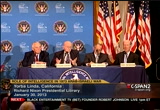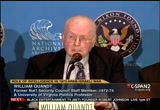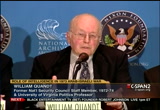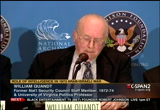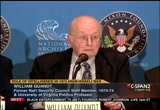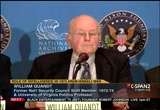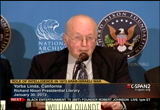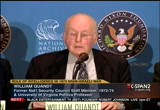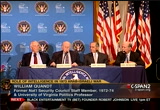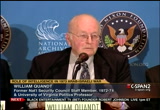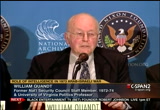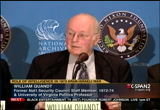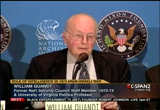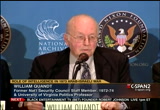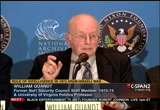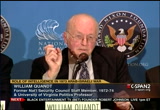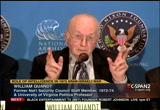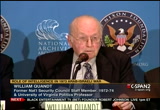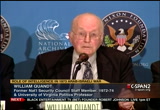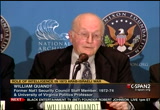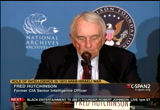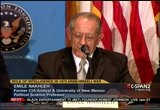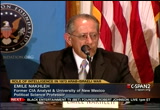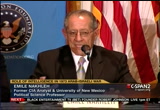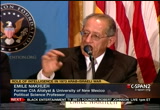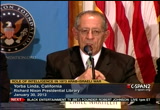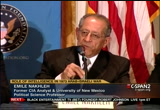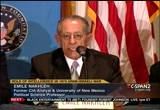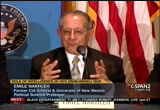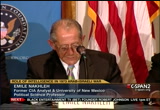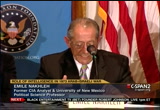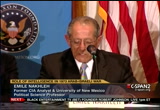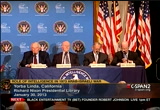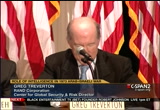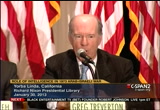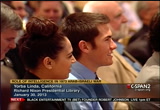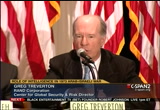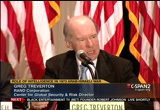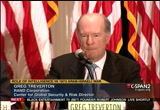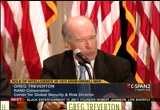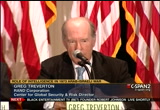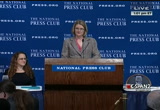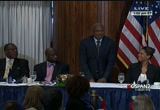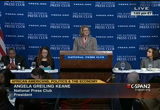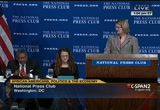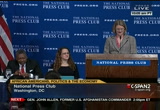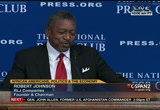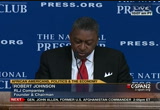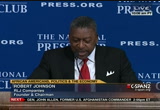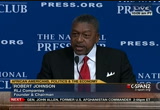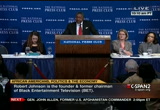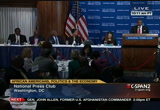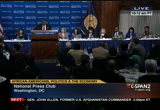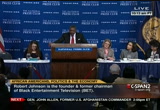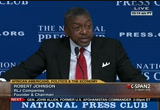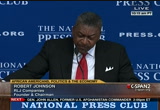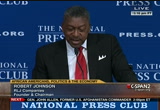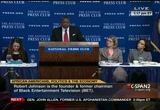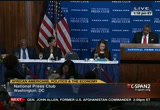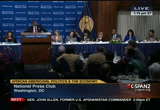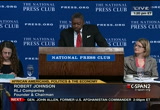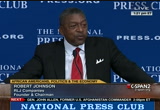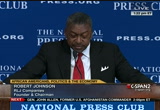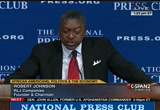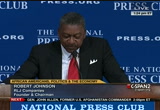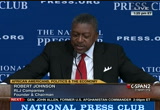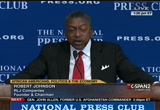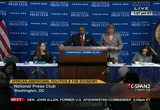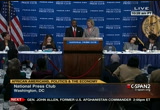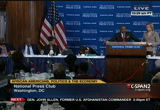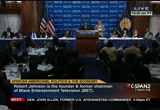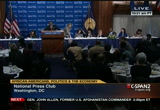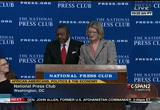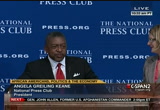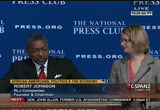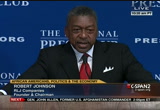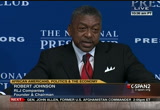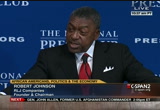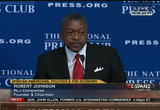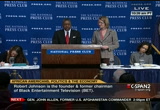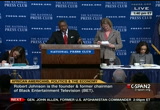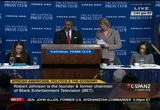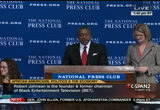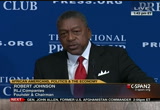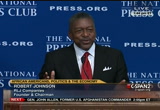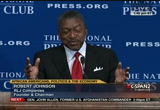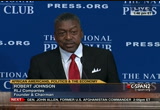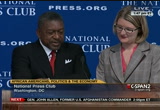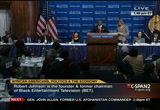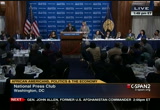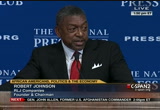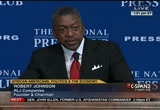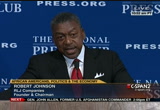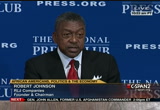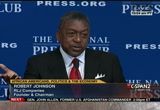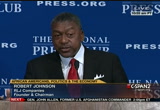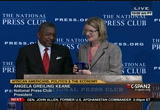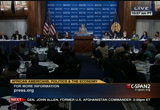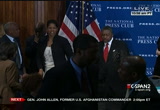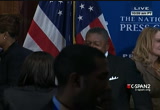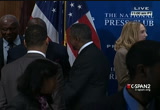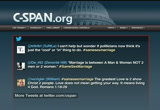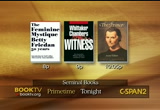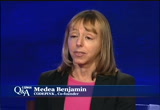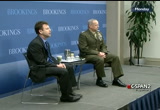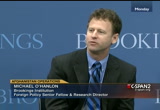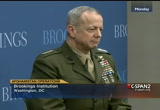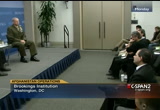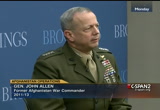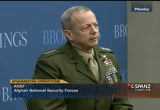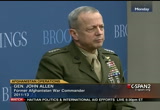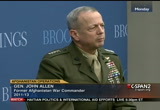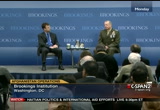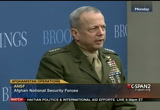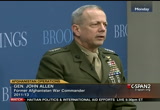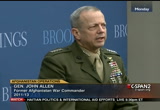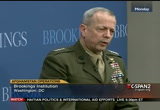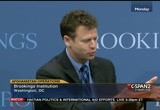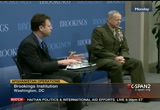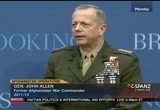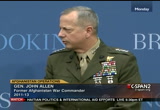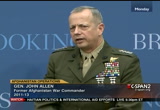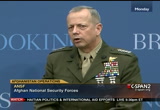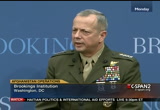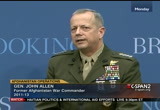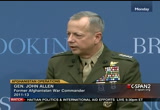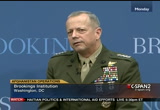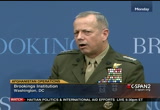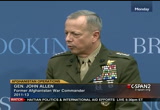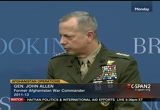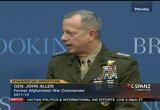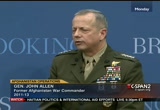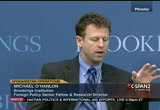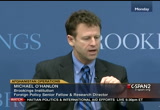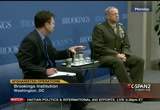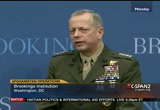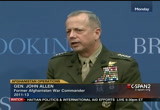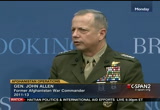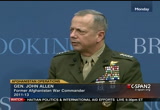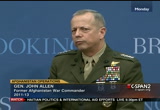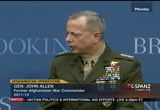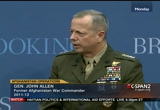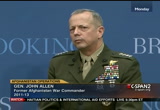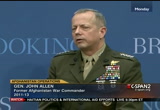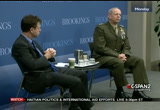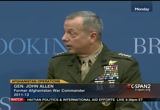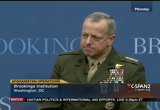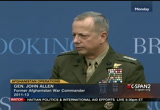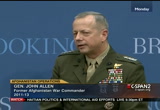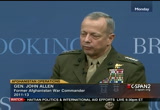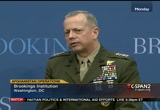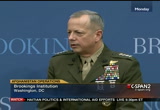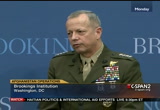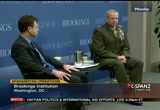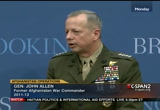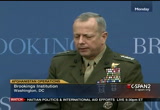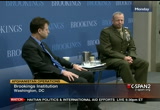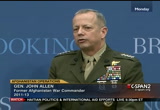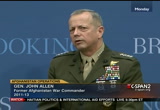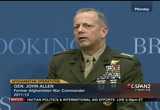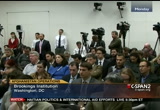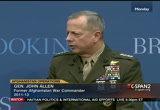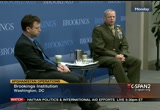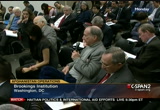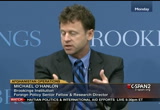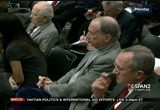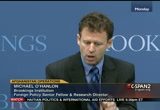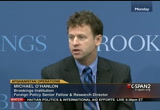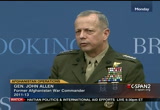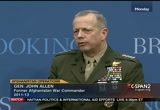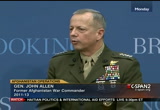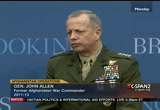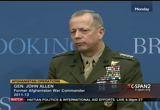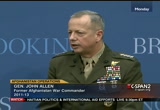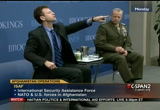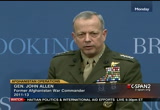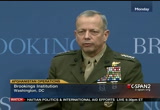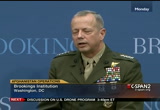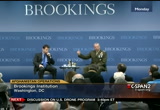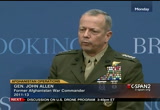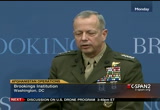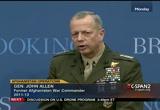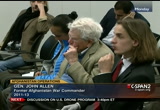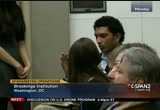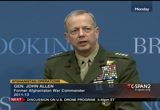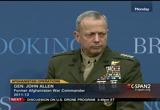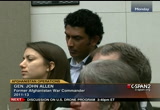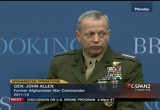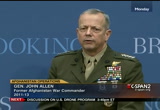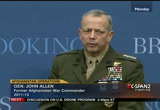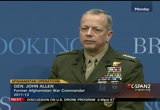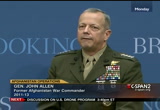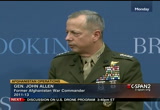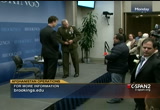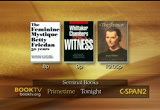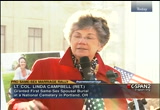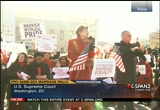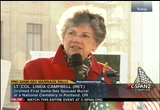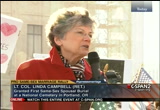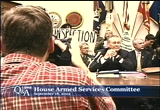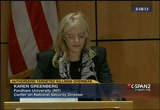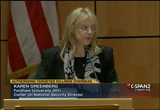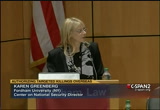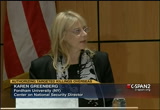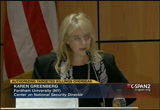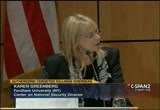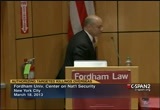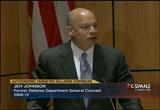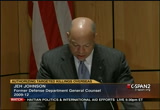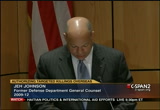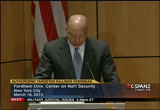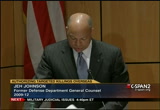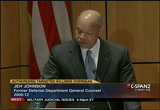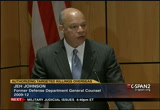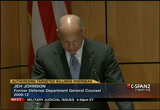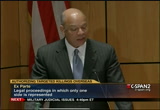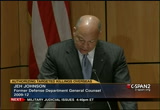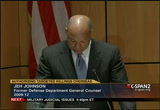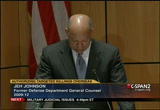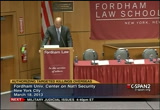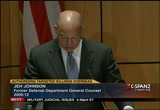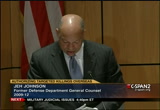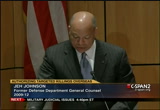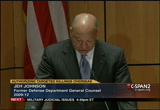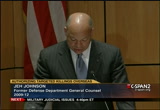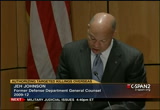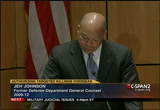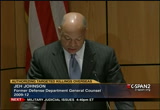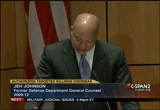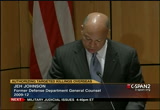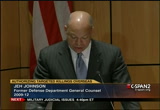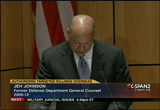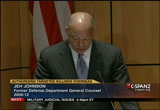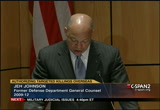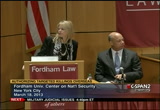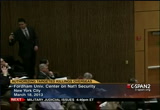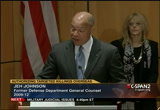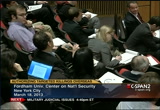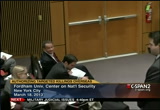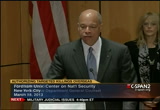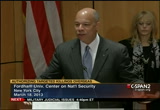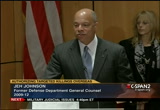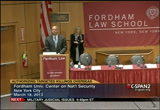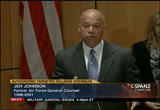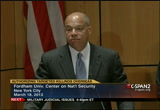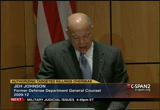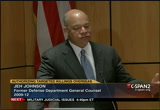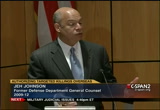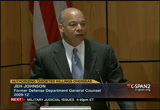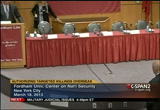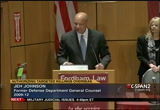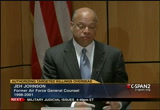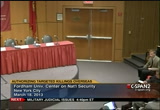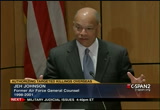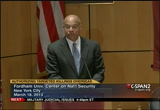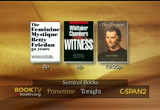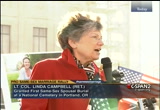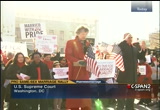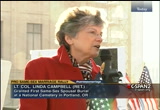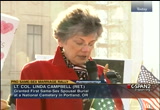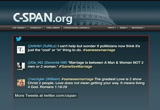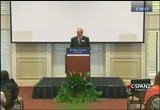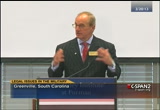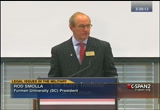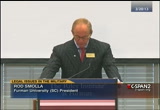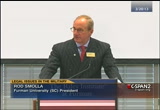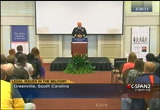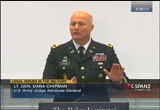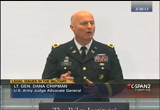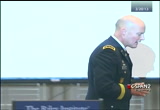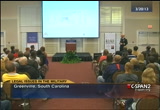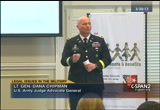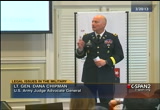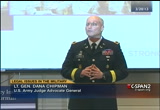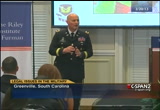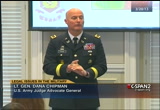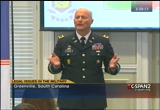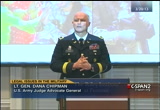tv U.S. Senate CSPAN March 26, 2013 12:00pm-5:00pm EDT
12:00 pm
12:01 pm
reports coming in from around the country last night, but as you're waiting here patiently, or coming here from other parts of the country, people were marching in allentown, pennsylvania. in casper, wyoming. in new hampshire, in dallas, texas, and last naught, thousands upon thousands upon thousands of people in my home town, san francisco. [cheers and applause] >> we're going to have to wait until the end of june to find out what the decision is, but all i have to say to you, before we go home and get warm, is that whatever the justices decide, we have already won the hearts and minds of the american people. [cheers and applause] >> and whatever the justices decide, you were always equal. [cheers and applause] >> you were equal in your
12:02 pm
ability to form and sustain loving relationships. we are equal in our ability to work and care for our families. we are equal in our ability to parent and foster and adopt. we are equal in our ability to serve our country, to build strong neighborhoods and healthy communities. we are equal in the eyes of god, and son we will be equal under the laws of this land! equal! justice! under law! in all 50 states, in all matters governed by civil law. that is what we're fighting for. thank you so much for being here. i love you. thank you so much. we're going to keep fighting, and we are going to win. [cheers and applause] >> we are going to win. equality! equality! equality! equality! equality! thank you. [cheers and applause]
12:03 pm
>> thank you. >> thank you all. we have come to that time, the courthouse is emptied out. we're going to see you again here tomorrow. the main thing we want to do is say, thank you, for standing up for equality. thank you for standing up. >> thank you so much, everyone. thank you. >> see you tomorrow. >> see you tomorrow. at it going to be a beautiful day. thank you. ♪
12:05 pm
12:06 pm
all of this going on because the supreme court is considering today two of the first same-sex marriage rights this week. the warriors in the california proposition 8 case are speaking live right now on c-span. here's what our viewer are saying. terra says, ookay, let's do thus. strict scrutiny all the way. a tweet reeds: the minute you say you do not deserve the same rights as me you're halfway to fashion system.
12:08 pm
[chanting] >> mr. secretary, we're going to put them down as undecided. [applause] >> mr. chairman, as i listen to those comments, instruct me what a wonderful thing free speech is. >> that is the hearing where donald rumsfeld was making the justifications for attacking iraq, and what you didn't hear in the clip were questions we got a chance to ask him, which is, how much money is halliburton going to make from the war? how many u.s. soldiers will be killed? how many iraqi civilians will die? and i'd like those questions answered now by somebody like
12:09 pm
donald rumsfeld. >> more with code pink cofounder sunday night at 8:00. >> 40 years after the start of the arab israeli war, newly declassified documents were released relating to intelligence covering the 1973 conflict. recently the richard nixon library and the cia hosed -- hosted an event. >> of our television audience, who may have just joined us, i want to tell you you're here with us at the richard nexton presidential library and museum in yorba linda, california, with a program presented jointly by
12:10 pm
the national archives, the richard nixon foundation, and the central intelligence agency. this is our second panel of the program, and before we get into it, i want to remind the members in our audience of the association of former intelligence officers that there will be a reception for you immediately after this program in our great hall. so i hope all of you will attend that. you have heard about intelligence in the 1973 arab-israeli war from the standpoint of the analysts, from their perspective. and now, in our next panel, we're going to hear about intelligence from the standpoint of the policy.
12:11 pm
our chair is fred hutchinson, a former cia intelligence officer. he retired in 1995, to work as an independent consultant, until he returned to the cia after 9/11. as an independent contractor and consultant for the cia today, he continues to work on near eastern affairs. he holds a masters agree in public law and government from columbia, university. he also graduated from the command and general staff college and the defense institute, and is a distinguished graduate of the ranger school. what impressed me among all of the awards -- and there are multiple -- is senior
12:12 pm
parachutist badge. so he is amazing, and has had an amazing career, ladies and gentlemen, fred hutchinson. [applause] >> thank you. i'm going to run this just slightly different. i want to draw your attention to this document right here, which tells you in some more detail about the background of william kahn, setting next me, and then greg. and at the end -- and in the middle is emil knockley, who you became acquainted with in the last panel. this segment is to talk about the policy perspective and that's how i became involved in this event, in the 1973 arab war, or the october war as i frequently refer to it. i was in -- i lived in me middle east before, during, and after
12:13 pm
the 1967 war. a few months before the 1967 war, i toured the lebanon, syria, jordan areas, and made some appraisals for my own purposes and my employers, of the situation, growing unrest, growing unease. the war occurred '67 war occurred, and then returned and this time for about three week, a review in israel of the -- each of the major battles and discussions with the intelligence officers and military commanders. i came away from that with a distinct impression the israelys were really on a high. they had surprised the arab armies in the 1967 war. and they thought that all of the chaos they created amongst the
12:14 pm
arab forces was due to their inferiority of manpower, equipment, and leadership. now, there was a great deal of the shortcomings of the arab armies, rested on those issues, but the israelis came away with a very exaggerated sense of themselves. i returned briefly to the united states in 1968, and i found that many of our military people -- i didn't talk to many intelligence folk at that time -- shared the same israeli view of the arab army. and a rather short-sighted view of what the political strategy might be in the arab world concerning israeli occupation of land they had captured in 1966
12:15 pm
and then having acquired additional land in '67. i went off then to fight a war in vietnam, which was kind of my major occupation at the time, airborne infantry ranger officer, and when return to washington i was assigned to the pentagon partially on the basis my middle eastern travel, knowledge, and experience there the first thing encountered was a policy issue. in the chairman's brief almost everything morning there was some intelligence and some policy issues presented concerning u.s. concern that it might be drawn into the increasing hostilities between the israelis and the syrians and the egyptians on the new '67 borders. i had an idea which i got the
12:16 pm
approval of secretary of defense to follow up on, was to draw up a plan for disengagement of the forces and to provide each party with sufficient intelligence they would be -- have confidence they would not be surprised by a secret military buildup on each side. so, i developed that plan, took it over to the assistant secretary of state cisco, and from there to the nsc. it got to henry kissinger, and he thought, that's interesting, but i can't persuade these folks to do this, to disengage they're forces and to quit sniping at each other. that's 1972. so, in february of '73, sort of as a free-floating agent, i floated over to the cia and joined the office of the director of central intelligence, and i took my little plan with me.
12:17 pm
and so i got over there, and the war happened. and you've heart quite a bit about that. my next role was as that war ran down, was to resurrect for dr. kissinger the plan for the disengagement of forces. that i put into play in the diplomatic arena. kissinger suggested and browbeat the parties into doing that. we tweaked the plan a bit, and he sent me off to sell it to the parties. which gave me an interesting experience to talk to presidents about and prime ministers, meir and various intelligence and army people. the next thing that i got involved in was to propose to the director that we do a director's postmortem on the surprise. you heard all about the surprise. you'll find in the declassified
12:18 pm
documents the proposal, how we tend to do this report. postmortem on our intelligence failure. failure of warning. you will also find in there a declassified version of the potion -- postmortem report of which i was a co-author. so i got involved in this, in an intelligence agency, but it start from a policy perspective. having set that stage for my own involvement, i now want to move on and ask bill quant, who is sitting here, on the national security council staff throughout this period, and who has a very distinguished academic career, as you can see in the bulletin. so, bill, i'd like to hear from you as to what some of this looked like from the nsc staff,
12:19 pm
from '72 on through the war. >> thank you very much. it's been an interesting experience to be here today and to hear the producers of intelligence talk, because i was fairly avid consumer of their products, and i had met some of them before but not all of them. so this is a 40-year-later finding the people who were writing these memos that attracted so much of my attention during the war. i was -- from 1972 on, through the next two years, the deputy in the middle east office working for henry kissinger and the white house on middle eastern affairs. on the day before the war began, for circumstances that are not particularly relevant for this discussion, i became the director of the office and with that came this enormous sense of responsibility. when you're number two you say somebody else has to make the hard call. all of a sudden i thought, my
12:20 pm
gosh, in might be a war on my watch, because there was actually a lot of details, information, that if you hadn't been through this five or ten times before, and didn't have a framework to say, well, we've seen that, we've seen that,ed looked pretty alarming. they were evacuating hospitals on the front line. that didn't look too normal to me. so started calling around to see what people in the various agencies that i dealt with were thinking, the cia and inr and the state department and so forth. the response was almost uniformly, we understand you're a bit upset, my colleagues -- my bosses wife had just died and he had to be home with the kids and so i had taken over, and i was upset. it was very emotional time. and they said, we're watching
12:21 pm
the situation, and we've seen this before, don't worry. and i thought, well, that's not too reassuring, but i stayed on,' and i also got one of these calls the next morning but i'm not going to tell you about more phone calls. i want to instead reflect on what we can say that is kind of general significance about intelligence and policy. policymakers have to work with a lot of different streams of information. one of which is intelligence, but there's also getting diplomatic cables, also on the telephone, talking to one another, and all of this is part of the process that results in concrete decisions. i would say that the -- there was an intelligence failure involving the 1973 war. we didn't see it coming, certainly not in time to do
12:22 pm
anything about it. but it wasn't a classical intelligence failure in the sense of a lack of information. it was, rather, a failure of imagination. we couldn't imagine that something like this would happen. and i think the reason for that -- and i think this went from the top from the president on down -- was that we had developed a way of looking at this region. we had a mindset that was largely forged in the previous middle east crisis. this is common. you look back to most previous -- the most intense previous example, and that was the 1967 war, which the israelis had won hands down, very quickly, and had left an impression that they were amazingly competent and that the arabs were totally incompetent. and i would say that it perhaps wasn't quite that explicitly
12:23 pm
articulated in anybody's mind, but it had left the impression that the arabs can't do anything militarily to reverse this, and that the key to stability in the middle east -- this is kissinger's view -- keep israel strong. deterrents will work. we know the arabs are unhappy, frustrated, angry, but until such time as they're prepared to sit down and negotiate and break with the soviet union, we just keep civility by maintaining the balance of power, and no rational arab leader will go to war if he is going to lose the war. and that's why we didn't pick up what were in fact quite a few signals that could have been interpreted more accurately. i want to look at three specific aspects of the failure, just briefly the failure to foresee the war, even though we did have some good tactical intelligence and very good human intelligence and some people telling very bruntly, it is going to happen.
12:24 pm
second there, was a failure to foresee and understand the oil embargo and its implications and how that would play out, and i want to say just a word about that because it actually is part of the 1973 war that most affect ed ordinary americans. people woke up and thought a crisis in the middle east affect mist daily life. few of you are old enough to remember what it was like to be in gas lines and people didn't like it. the third issue i want to talk about briefly is the issue surrounding the cease fire in place and the air lift to israel. it's a little bit technical but actually very important and for a short period, and intelligence did play a role in our -- the way it was handled, and the new documents, incidentally, shed a bit of new light on that. it's been a best controversial,
12:25 pm
i have written a version that henry kissinger does not agree with, and there are different points of view on what happened. one makes him fairly heroic and puts the blame for certain things on the defense department, and i think is probably -- way to go. and then if there's anytime i might mention a word or two of the alert at the end. the surprise was not total. we had been in some sense forewarned, but we had a way of explaining away the warning. the most relevant was king hussein had told us on several occasions he had information from sources in syria -- in fact he had the war plan which he had given to us, and it was on file in the cia, and he told the israelys themselves -- in fact he went to israel and met with golda meir and said there's
12:26 pm
going to be a war and you may think they're faking but they're not. and the israelys just as we, when we heard the report, saved they're faking, they're trying to bluff us into launching a diplomatic initiative to get the israelis to withdraw from the occupied territories, and it's nothing other than a bluff. but then we have a meeting between president nixon and general secretary brezhnev in which he demanded a special meeting to talk about the middle east, and he said, don't know exactly when it's going to happen, but there is going to be a war in the middle east this fall. unless we can do something to prevent it. now, that information i knew, and took seriously as i think kissinger did, not as a presize warning but he start asking us to watch carefully for any signs it might be true.
12:27 pm
i don't believe this information was shared with the cia. and this is a problem where policymakers know things that they don't convey to the analysts. and then, of course, we saw the soviet advisers leaving a few days before, and in the very last day there were very strong signals of -- that war was a possibility. i can tell you that on october 5, i was actually quite nervous. but there was this issue that has been mentioned several times. the israelys didn't seem to be worried. at least they isn't through the day of october 5th. that changed overnight on the 5th and the 6th and i heard from a pretty well plugged in person in the policy part of this, is that the israelis would know if there was going to be a war because they had great
12:28 pm
intelligence and they had a source high up in egypt, and they didn't -- i didn't know who it was at that time. israelys have now said -- not total yunnan him inity on this but the people i take seriously say they recruited a very high-ranking egyptian, he happened to be former president nassar's son-in-law, which makes it even more interesting, and that they were quite sure that if this was for real, they would hear from him, which they did, on october 4th he demanded a meeting in london with their military intelligence. military intelligence flew to london. was debriefed by him. went back to israel, reported to the prime minister, and that's what changed their perception so that the next day, we got the message from golda meir, there is going to be war and it's going to happen by the end of
12:29 pm
they today. and that's the message i received from the situation room on october 6th when i said, my gosh, it is going to happen and it's going to be on my watch. so we had -- we were misled by the relatively calm view of the israelis until about 12 hours before it all began. the failure to foresee the embargo was an intellectual failure shared throughout the government with one or two exceptions. we did not understand how the international oil market used because until 1970 there was a lot of oil in the world and if one country got angry and said we're not going to sell you oil, we bought oil somewhere else and the price didn't go up because there weren't shortages, and we'd been through this in 1953 crisis, 1967, and there was mindset and a slogan almost that
12:30 pm
oil and politics don't mix. they arabs have to sell their oil. they can't drink it. but the oil markets had begun to change, and there was no longer a big spare capacity anywhere in the world. saud diz didn't have any extra. venezuela didn't have any extra, indonesia didn't have any extra. everybody was producing all out. so if in addition to embargoing oil you also cut the amount of oil on the world market, you were going to have an explosion of prices, which is exactly what happened and was not anticipated. and i think it's partly a problem of foreign policy strategists aren't very good economists. henry kissinger is a very smart guy on the politics and grand strategy. he was way ahead of the rest of us but on economics he was like economics 101, maybe even worse. the one person in the room who understood this was jim schlessinger, who was trained
12:31 pm
economist, who had studded oil markets, and i remember in the first day that somebody is trying to speculate about what does sadat expect to get out of this. he is going to lose militarily. schlessinger says the only sense it makes if thinks the saud diz are going to impose an embargo and but backs on oil. and this is ten days before they actually did it but he saw there was a possibility that could be done and that made sense of what otherwise look like an extremely risky strategy for sadat. and that was part of the plan. we missed that because we had never been through anything like this and honestly didn't understand how oil markets work. we understand better today and as result we let prices go up and down and up and down, doesn't come down very much these days, but we learned to deal with the volatility of oil markets in a way that simply had
12:32 pm
not been experienced, because for two decade we had had very stable and very low prices of oil. third issue i want to discuss relating to intelligence to policy had to do with a very delicate moment in the diplomacy where kiss kin jerry -- kiss sip jerry and nixon -- nixon is preoccupied with something called watergate but not completely absent. he doesn't meet with anyone other than kissinger, and it's clear that nix con is giving direction. what they want to see by october 10th or 11th is an early end to the war, before it gets out of hand. it was a little bit of a stalemate at that point. they wanted to end with u.s. soviet cooperation because they
12:33 pm
still valued detente and there had been nothing about oil up through october 11th. the problem was that the soviets were beginning to resupply the egyptians and the syrians, and doing it on a scale that looked large. we didn't know the content but we saw the planes going in. and the question came up, should we immediately respond with an airlift of our own to israel? and kissinger's initial instinct was not if we can get a cease fire first. we already toll that israelis we will compensate them for all the losses they have taken, but if we can end this without directly invaccining it would be -- intervening, it would be better. so we got the israelis under a little bit of pressure to accept the idea of an immediate size fire. they weren't happy but agreed, and soviets said egypt would agree as well, about egypt turned it down and that triggered our decision to go with the full-scale airlift,
12:34 pm
which president nixon said, if we're going to do it, let's do it all the way, as big as you can, because we'll get as much blame for doing a little one as for a big one. now, we could not have fine-tuned that diplomacy, which ultimately didn't work, although if it had it would have been a better outcome to the war. if we hadn't known that on the ground the military situations had reached this relatively delicate point where a cease fire in place might be a possibility. and i think that's where the daily intelligence by then was actually quite good on what is happening on the battlefield and who has the upper hand. so even though that particular initiative failed, we could not have played it as finely in terms of just judgments about almost hour-by-hour what was possible, had we not had good tactical intelligence.
12:35 pm
finally, on the alert, which recalls -- we gerted cease fire in place. the israelys actually violated it, and the egyptians got quite hysterical because they're about to lose a full corps which would have been a disaster for the egyptians. on the morning that we had -- after we had announced this worldwide nuclear alert, which was a fairly dramatic thing to do, intelligence almost got us into trouble because we had a fragment of unevaluated intelligence, where we got a part of a message from moscow to the embassy, russian embassy in cairo. sometimes you can just decode a little of the message, and a little bet said, soviet troops arrive cairo 3:00 p.m., and given our fear that the soviets
12:36 pm
were going to send troops in to enforce the cease fire and the threat they were going to do that, and the fact that all of their airlift was back in russia, and they had seven airborne divisions on alert, kissinger said, that's it. they're going in, and he turned to me and one other person and said, you figure out where we go in, because if the soviets send troops into the middle east, we have to send troops into the middle east, and he walked out of the room. i thought, oh, my god, this is getting very, very serious and dangerous. an hour later he came back and said, forget it. i talked to dough brian -- do brianin. its a misunderstooding. i forgot we agreed that military observers were going to go in just as we were going to send 30 of our unarmed observers to observe the cease fire and that's all it was about. fortunately we had another way
12:37 pm
of checking what this was about. but intelligence can sometimes inform you and sometimes mislead you. >> i'm going to sum up by saying one last thing. i don't think that the documents that have just been released radically change anything in our understanding about the crisis, partly because it's been written about a lot. there have been previous releases of documents. but if you are interested in the policy process, the minutes of the washington special action group meetings, which are now all in there, including one i wasn't even allowed to go to as a relatively -- a staff member, principles only -- for the fir time these are now available, and those are really interesting. we also have these tapes of henry kissinger's phone conversations with the president, with the israeli ambassador, with his soviet ambassador, which are extremely interesting.
12:38 pm
what is missing and probably will be missing for quite a long time, is the little bits of overtone of a nuclear shadow in this crisis. nobody mentioned, but on october 8th, we did pick up indications that the israelieds had alerted their jerico missiles we didn't know what they put on the end of those missiles, but i can understand why people don't declassify that, but at the time we had knowledge, soviets had knowledge, i'm sure the egyptians had the knowledge, that the israelys but a surface to surface missile on alert and the only sense i it could make is because it had a nuclear warhead on to. we also had specifics that the soviets hat perhaps put -- that was never confirmed and i don't know if we know that's true. so there are a few small issues that maybe still can benefit from some additional light, but
12:39 pm
by and large we have a pretty good picture of what happened in this crisis, at least in terms of how american officials understood it, and despite the initial failure to anticipate the war, which was a shared failure and was, as i said, mindset failure, i think we recovered from that fairly quickly, and i give a lot of credit to kissinger for this, who was totally perplexed by what was going on in the first 24 hours, and very quickly found his footing, partly because he communicated with sadat directly, and sadat told him what his intentions were, and kissinger decided to take him seriously. and from then on, we played our hand with a certain degree of, i think, sophistication and skill, and we would be in a position to launch a diplomatic initiative, which is what the president wanted when this was over, and had we nod hat good tactical
12:40 pm
intelligence after the initial failure we couldn't have done that. >> thank you. [applause] >> next we want to have remarks from emil from the last panel, and then we'll move on after this at least -- these comments on the policy aspects, to greg trevorton, who is going to give us a review of the issues that have arisen since '73, of the issues that were well illustrated by all this previous discussion. so, emil? >> thank you, mr. chairman. in the '70s and '8s, i was a project -- in a project capacity as a consultant with policymakers in two specific
12:41 pm
issues. one was the west bank and gaza and the plo leaders in jerusalem, and the relationship between them and plo in order to facilitate the piece agreement it -- peace agreement ultimate limit the second was the first few years of the iran-iraq war in iraq where i went there several times to talk to iraqi leaders, iraqi intellectuals, about their changing attitude, not only just towards iran, of course, but basically towards the u.s. and of course in '84, '83, we re-established diplomatic relations with iraq. and then at the end of that decade, in the '90s, went i went to the agency, made the
12:42 pm
migration, contrary to most senior people in government, they usually go to academia after they have an illustrious career in government. i did it the other way can that migration was a very beautiful experience because of that expertise in those areas outside government and then in government. so, when i started there as a scholar in residency, dci pass thyroid my office and said, what is this scholar in residence? what do you do? i said i sit, i talk to an lists, i brief policymakers, i look at our intelligence for the year, and i write, and he said, and we pay you for that? i said, damn right, you do. and then we started basically helping to build that expertise in the region.
12:43 pm
now, i had talked to a number when i was -- in an article i referred to in the previous panel, talked to a number of policymakers but -- about their reflection on the war and the lessons that emerged and their experiences specifically in the 1970s. now, as policymakers began to understand sadat strategically thinking, policy became the driver,, of much intelligence during the '70s, in fact the cia in the '70s had not had a good standing, congress was screaming, senator church was screaming about the agency, the agency was not really feel going about itself, and you have the '73 war and then, of course, '88, '89, the fall of the shah. so the agency in that fateful
12:44 pm
decade was really not a player. in fact, policy on those very important policies that emerged from the '73 war, policymakers were the driving force rather than intelligence. and to his credit, secretary kissinger emerged as the key architect of the post '73 balance of power in the region, and the -- of that structure in which he told israelis in no uncertain terms our relationship with israel was going to allow for two things, like it or not. one, to pursue a peace treaty with the arabs and, two, sadat becoming a key player in the search for peace. and that was as early as almost two or three days after the war, and that continued in a sense with the following
12:45 pm
administration in a sense of -- and ultimately camp david. now, when i asked policymakers to identify the key issues -- many of them frankly from the 1970s, very, very important decade in our policy for the next 40 years, and they identified and -- the oil embargo and how to adjust to it. bill mentioned about our understanding of oil, but the other thing we did not physically understand was the impact on the -- of the nationalization and creation of opec of oil-producing countries, specifically on saudi arabia. and saudi arabia in the late '60s, before even the war, established that proselytizing
12:46 pm
islam was a weapon they were going to use against communism and nazi brand of arab nationalism so they established the muslim world league, the iiro, all as islamic ngos, to serve saudi arabia's foreign policy objective. in fact it was one of the principle objectives of saudi foreign policy was the use of islam and the state of islam as a cardinal principle back in the late 60s. when you ad that to the creation of opec, the whole attitude and power of oil-producing countries changed. that, by the way, was another area where, when we look at saudi araina, we they ever thought that saudi arabia was going to use oil as a weapon because of all that previous
12:47 pm
history. the second was urgent u.s.-soviet u.n. contact for the purpose of ening the conflict and starting the peace process going. the third was the weapons supplied to israel and how kissinger and the president ultimately made that decision, and that was used even by the administration to recalibrate our relationship with israel to allow for sadat in the mix. and four was a search for an end to the arab-israeli conflict and the saudi leadership. fifth, all of that in that -- in the early part of the '70s, opening new channels of communication to sadat, and six
12:48 pm
was the leadership and polite: -- political dynamic we began to understand both in egypt and syria and in israel. it was even a major change in the domestic political scene in israel. for the for time by '77 we saw the end of the liberal government in israel. they never recovered from that. and we saw a new alliance of more conservative, more-i guess, -- israelis -- begin created a knew alliance. we had been used to labor, and in a sense almost kind of european way of thinking. now we began to see a new way of thinking in israel under the new government, which in a sense has continued throughout. then we began to also understand
12:49 pm
ascending raul of saudi arabia the result was kissinger kissinh was through riyadh, and all of the policies that began to take root in the '70s, almost governed our relations in the region for the next 40 years. now, intelligence analysis really specially the economic analysis, really played a very good role in assessing -- and i spoke to a number of our senior economists assessing the whole impact of the oil embargo, and policymakers found that to be very, very useful. the whole analysis of economic -- the oil embargo and
12:50 pm
the impact in talking to policymakers after the '73 war, i came up with a few lessons which they themselves identified. one was sadat's interest in waging a war with a political end in mind. that was a lesson that they said, we have to learn more about. and in a sense using war as a diplomacy by other means, we did not think that sadat was really at that level, pushing for the four political goals. that is ending the occupation, re-opening the suez canal, resulting arab israeli conflict and establishing closer relation with the u.s. of the second lesson they identified was the denial and deception as being very critical factor in reading a leader's intention.
12:51 pm
the third was before the war, the saudis did not, as has been indicated, as a weapon as a political weapon, but in fact they reached that decision right during the war, especially after the airlift to israel, and they began to use oil as a political weapon, and, again, that was -- we saw that was unlikely because of their position on islam and against arab nationalists. the last point i want to make was that the '73 war really -- for fundamental changes that rocked the region for not only through the end of the decade but through the end of that last century. i think as a parting thought, i would say despite our
12:52 pm
intelligence failure to anticipate sadat's war move, the major policy that were adopted in the '70s, have had a huge impact that we are still talking about today, and in a sense what drove those policies in the '70s were policymakers rather than intelligence analysts. thank you. [applause] >> thank you. dr. greg trevorton is going to try and very brief amount of time to summarize lessons we have learned and tried to apply in the 40 years since. >> thanks. that's a tall order and not much time. i should admit i am -- have mostly steweddously avoided the middle east in my career so i'm far from an expert. i'd like to reflect on this case
12:53 pm
as -- what it says for the broader process of relation between intelligence and policy. there i'm a student and sometime practitioner and also aware of the famous line by speaker wright years ago during the confirm nation hearing of john tower to be secretary of defense. he asked what was going on and he said, everything has been said but not everyone has said it yet. so i hope that my reflections will -- what i hoped to do is pick up three themes and end with one lesson. the first theme violate mist favorite lines, thou shalt not with statisticians sit or commit social science. i through the years bored many colleagues, probably including charlie and an diwishes any dinks between puzzles and mitts as intelligence problems.
12:54 pm
puzzles or those thing waves an answer, how many missiles the soviet union had, classic cold war intelligence problems were puzzle. moist are things that don't have an answer, nobody knows the answer, they're contingent, they're iffy, they depend. dangerous to talk about warning in front of charlie allen but i'd like to focus on the pre-war phase. recognizing doing so in his present is like talking about arc building with noah, but what -- [laughter] >> what warning seeks to do in my view, all of mystery addressing is really -- it's a process of taking essentially subjective judgments and trying to refine them in light of incoming evidence. that warning -- true of warning, specially warning war, where the effort is to turn a mystery --
12:55 pm
will they attack -- into a puzzle, and to do that by identifying indicators. the more of the indicators flash red, the higher you think the probability of war is. that's theme one. theme two picks up from the conversation about assumption. i should say in parenthesis, my watch word about assumptions which i've never been able to clean up, comes from a former pentagon colleague of mine, at least made its unsexist, the best version i can do it, assumption is the parent of -- i want to pursue that from a different way of -- i've come through a career thinking about intelligence policy to think of intelligence as basically story-telling, building and adjusting stories. i guess i would say it's bayesian store-telling but that
12:56 pm
spoils the simplicities of story-telling. without a story new information doesn't go anywhere. on the other hand if the story becomes too widely believed, too firmly believed, it cuts off information, it's called -- some people call it mindset, concept, it tends to be at the root of most things we call an intelligence failure. so, story is critical. theme three is somewhat the opposite of our conversation today. i'm struck by looking at this case how the intelligence was not too bad. it was too good. almost too much of it. all of the efforts at deception we talk about and bill catalogued the things on the other side that could have been indicators. israel is a big piece of it, our relative deference to israeli
12:57 pm
views. that's a mistake we probably are less likely to make. bill also mentioned the agent the israelys thought they had very close to the top. i find him a fascinating case. he manages to be both admired in israel as a spy and admired in egypt as a purveyor of disinformation. as i read the case, he reinforced the story. the story here was sadat won't start a war he can't win. and the story's reinforced because for from him the israelis heard about sadat military disadvantages. he is worried about israeli air superiority and until he gets longer range identifieders and better scuds from the soviet, he would not attack. so at the very late hour, seems
12:58 pm
to me he reinforced the story, until and israel, and by extens, saul the soviets providing those things to egypt, there could be no war. the lesson i draw from this is in some ways the stronger and more pervasive the story, the more important it is to look at what evidence you have. most of the time i think american intelligence too focused on collection and information and not enough on thought. but here i think it's very important to look at the information, because you have to take seriously the possibility of invasion. you would have to say all these indicators suggest maybe there is going to be a war to get into the set of questions that mark outlined, the the contextual factors that might take you to oh, there are some reasons he might start a war he can't win
12:59 pm
fourth crack through the story would require looking hard and taking seriously the possibility that there might -- all those indicators or war might be real. let me conclude with just a couple other examples of where i think the same thing is true. charlie's successor, was active during the crisis in mexico in 1995. and what she was doing was looking at the date attempt kept looking at mexican reserves and saying, they're going down, down, down. these people are going to have to devalue. well, she got countered by the click stories from wall street and treasury, in the end the mexicans were lying about reserves. they were worse that the published statistics and in the end they devalued. to cut throw through story that the wall streetersers and truss treasury folks was to pay
1:00 pm
1:01 pm
all the more so, the stronger the stories that we hear. [applause] >> you can watch this on c-span.org. we have remarks by the national press club. ahead table is being introduced. >> thank you for joining us come and you can join in our question-and-answer sessions. now it is time to introduce our head guests. please stand up as your is your name is announced. from your right, the host of sex, politics, and religion our on russia radio.
1:02 pm
eddie brown, chairman chairman and ceo and founder of brown capital management, nikki schwab, a columnist for the washington examiner, april ryan, the white house correspondent for american urban radio network, tracy blunts, the senior vice president for corporate communications and public affairs. and don larsen, the speaker committee chair. and the senior vice president with the msl group. thank you so much for organizing this today. todd brown, who is a guest and a speaker. is a he is a member of the national press club board of
1:03 pm
governors. and aski mohammad and john doyle, ceos of the principle number. i'm grateful that you could be here today. [applause] >> our guests today include the first billionaire, the first african-american on the new york stock exchange come in the first black majority owner of a professional sports team. robert johnson founded black entertainment television, which he sold to bet and viacom in 2001 for about $3 billion. mr. johnson has made his fortune targeting a black urban audience first-out bet, the nation's first television network to provide entertainment and music and news and sports and public affairs programming for an african-american audience. after its 1980 debut, the company went public in 1991 with bet channels reach about 90% of all black households with cable.
1:04 pm
he sold it to viacom seven days after its ipo. it is now part of the viacom empire, which also includes comedy central, nickelodeon, spike tv, and much more. mr. johnson shook off critics over the years, including spike lee, the complainant that bet programming included too much sex and violence. mr. johnson is the former majority owner of the charlotte bobcats. he sold his stake to michael jordan three years ago. in his post bet career, he is raising money as chairman of rlj and investing in businesses in and out of media entertainment. includes real estate, private equity, and the video lottery in
1:05 pm
february the company launched the website to match minority business owners with africans. mr. johnson said a chief reason that he created this site was to reduce the disparity in unemployment for minority americans. mr. johnson, a father of two children, is known for his 15 hour workdays and 60 work weeks. he is a native of hickory, mississippi, and he broke with his nine siblings in freeport, illinois. his early work included delivering newspapers, and he has since said that that is something that required him to get up way too early to do. [laughter] heaped on his way to washington after college and through a series of jobs including what was then the national cable television association.
1:06 pm
that helped him create his own cable network. mr. johnson is here today to announce the findings from a pool that he commissioned on black opinions in the age of obama. it surveyed about 1000 african-american adults online and by telephone to gauge the community sentiments on politics, the economy, and social issues. please help me to give a warm while come to robert johnson. [applause] >> thank you, angela. good afternoon, everybody. i am delighted to be here. i was sitting here talking to donna and she she said you know you arrive on your faces on a cookie. [laughter] april ryan said she was going to tweet it. >> i would like to recognize alison fitzgerald, a chairwoman
1:07 pm
of the speakers committee. thank you very much. again, thank you for it the kind introduction. thank you members of the press club and tests for being here this afternoon. a national poll was conducted last month. as many of you know, johns hopkins has conducted and produced polls for over 30 years. and is well respected for his accuracy and credibility and reliability. a random sample of 1000 african-american adults across the country who gave their opinions on current social and economic political issues directly affecting the african-american community. as most of you know, we have always been vocal about economic
1:08 pm
opportunity for african-americans. as the founder of bet and now the rlj companies, as angela pointed out, includes investments in a $2.5 billion hotel, some 20,000 rooms across the country. i have served as executive chairman. the largest minority automobile dealership in the country with over a billion dollars in sales, turn to private equities, a private equity firm partnership with the carlyle group. and rlj entertainment. the largest independent distributor of entertainment goods on the stock exchange. i get an idea of what should be done usually in an area where we
1:09 pm
can address the social and economic problems. for example, as angela pointed out a year ago, the rlj's companies launched an online job and business site for minority individuals and minority owned businesses to large u.s. companies to encourage employment and business opportunities. includes opportunities for shareholders to have the important goal of empowering african americans who have the ability to create value and wealth for themselves and ultimately this nation. make no mistake that there are millions of african-american men and women who have the talent and the ingenuity and the work ethic to fulfill these goals. i think you would also agree
1:10 pm
with me that this nation has created the greatest society for individual economic opportunity and achievement that mankind has ever seen. but despite that fact, there is a troubling question that has to be asked. that is to what extent do african-americans would participate in this equation. my primary concern is why after enacting and enforcing civil and equal rights law, spending more money on education for african american students at all levels than at any other time in the history of this nation, having twice elected an african-american president, black american families are still experiencing access to capital, employment, wealth
1:11 pm
accumulation, and as a direct consequence, stagnation and quality of life. in an attempt to answer these questions, i commission a poll with the following economic development in mind. number one, the black americans, for them, this country has experienced the most important political event since emancipation population. that event is, of course, the election and reelection of the first african-american president, barack obama. there is this monumental occurrence. i want to find out how african-americans today felt about obama's presidency. and equally important, if they feel that their lives are better off having lived under the first four years of obama and the
1:12 pm
prospects of an obama administration for the next four years. number two is this nation is engaged in a major debate about the role of government in providing for the economic well-being, the working and middle class america. without question, most african-american families fall within that category. it raises the question of how much entitlement security the government should make available to the citizens, and who should bear the costs for such transfer of payment. the issue being raised is whether this company's economic future is at risk because of the rising costs of entitlement and the debt and deficit that follows. no matter how it is resolved, it will likely impact american families that are african-american more so than any other population.
1:13 pm
we are seeing a decline in economic growth and opportunity for all americans. but african-americans have been the hardest hit. this has been true in the past. it is true today as the most recent economic data drives home that fact. african-americans have double the rate of unemployment as white americans. the national average is 7.7% and african-american employment is 13.8%. to be honest, it is probably greater than that when you count the number of african-americans who have given up on finding employment. sadly, this is not a new fact. according to the u.s. bureau of labor statistics, african-american unemployment has been doubled up for over 50
1:14 pm
years. the income gap for white americans is 10 times that. of white americans. the network is $11,800. the gap between black americans and white americans over the past 20 years has increased from $20,000 up to $90,000, according to the pew research center. according to the pew research center, nearly half of african-americans born to middle-class families in the 60s will never attain the wealth of their parents. number three, african-americans were once the largest minority group in the dominant force
1:15 pm
dating back to the civil rights movement. african americans are not confronted with the growing influence of the hispanic population, which is the largest minority population grew. i wanted to gauge african-american sentiment of economic changes that could result this demographic fact could lead to hispanics potentially exercising influence on key issues that are important to african-americans, namely competition for jobs and minority business opportunities. perhaps even hispanics becoming the dominant ethnic voice on cultural and social issues. number four, i also wanted to find out how african-americans feel about their political leaders and organizations that represent them.
1:16 pm
including key and social cultural issues at the moment. for example, immigration reform, marriage equality, the gun and assault weapons ban and the 2016 election. it targets african-americans with this combination of social and economic and political questioning. as an entrepreneur, i decided to do it. i wanted to create a discussion within the black community and the broader community to bring to the forefront of public debate key issues of primary concern to african-americans. i am pleased to say that i am intrigued by the results and i believe that i am better informed and i do hope that you will also. now, in spite of all the political and economic realities, which i just outlined, what intrigued me was
1:17 pm
that the poll results point to a black america firmly believing that there lives are at a glass half filled rather than a glass half empty. so what it does poll revealed? african-americans have an immense sense of pride in barack obama is president of the united states. he received a 91% favorability rating. 72% believe the president obama's election, consistent with the data that shows that african-americans believe that obama's election has helped them, 62% are optimistic about employment in the next four
1:18 pm
years. 30% have responded and say they are doing better off financially than they were four years ago. 25% say that african-americans in general are doing better. 44% say that they are doing about the same. 21% say they are worse off. >> tied to this feeling that obama's president has been positive for african americans, 53% of african-americans say that white african-americans will improve. only 23% are pessimistic. when asked why they believe the black unemployment rate was double that of whites, the responses include education system for african americans. 50%. a lack of corporate commitment to hiring minorities and
1:19 pm
african-americans, 40%. and lack of government policies, 25%. as to whether they felt discounted because of their race, 47% said yes. 39% said no. when asked why the wealth gap has increased over the last 70 years, nearly half of respondents said that both lack of jobs and lack of access to capital are to blame for the gap between black and white americans. now, since i agree that these are the most pressing issues for african americans, i also asked the poll about something i have been promoting for the last two years. when i called the roj rule. which was adapted from the nfl. in 2003, they established this
1:20 pm
woolwich mandated subject to a fine that the 32 team owners must give fair interview interviews whenever a head-coaching or general manager position becomes available before making a new house. the roj rule, as proposed is a voluntary rule and designed to encourage companies to establish best practice policies. the least to applicants at the managerial level before filling a position in to interview qualified black businesses prior to ordering a small business procurement contract. we included a description of this and found that 75% of those polls were either various or somewhat supportive. 47% said that they would help
1:21 pm
african-americans chances to be higher or become a minority supplier. 53% said they would like to see the roj rule enacted into law. the poll also asked who would be the voice for african-americans to make sure that voices were heard. the naacp, he received an 83% favorable rating. and the congressional black caucus are saved 60% rating. when respondents were asked for the name of individuals who best represent their answers, an overwhelming 40% said that no one speaks for them. it focused on issues related to the emergence of race relations,
1:22 pm
guns, and the 2016 presidential election. 63% of african-americans favor a path to full citizenship within 10 years for hispanics who are here illegally. while only 16% say they should never achieve full citizenship. interestingly enough, 51% of african-americans believe that hispanics will achieve greater economic growth and african-americans over the next five years. 39% of 18 to 29-year-old share this feeling come in 60% of those 50 years old and older. some of the reasons for this include less racism in america.
1:23 pm
they are given more opportunity and education is better. 67% of african americans favor a ban on assault weapons. 20% oppose such a thing. this includes the majority of all age groups. expressing a deep concern about reaction to gun crime in the black communities. 75% of african-americans believe that black on black gun crimes versus gun crimes black against white. african-americans evenly express on the issue of same-sex marriage. 42% feel that marriage is physically defined as between a man and a woman. while 40% would support gay marriage and having the same
1:24 pm
rights as heterosexual couples. we also asked the question about ministers who opposed homosexuality. one is a 34% difference. one in three people say they have no opinion. of the 2016 presidential race, we ask the question, if the democratic primary for president were held today, would you vote and who should president obama have is the next president of the united states? out of six potential democratic candidates, nearly half of the respondents, 46%, say that they would support hillary clinton for president of the united states is the democratic primary were held today. about one in five would support vice president biden. in conclusion, the poll clearly
1:25 pm
demonstrates african-americans having an african-american president elected to two terms has created a tremendous feeling of unparalleled political workings. despite all of the economic challenges, i believe that african-americans are uniquely hopeful about their future this was expressed by president obama during his recent speech to the president of israel? speaking about the african-american experience. he told a powerful tale to reach liberty and human dignity.
1:26 pm
a tale that was carried from slavery through the civil rights movement. it helped people with poverty and persecution, holding onto the hope that better days are on the horizon. i completely agree with the president. however, my concern and maybe even fear is that if this face like hope and a promise of a better day on the horizon is not rewarded with a real and measurable economic change, during and after the obama presidency, the failure to do so would be regrettable for african-americans and for the nation. resulting in a major shift from
1:27 pm
hope to despair for millions of african-americans who today look at this nation in the age of obama and say, the glass is half filled and we are still hopeful. thank you for your time and i will be glad to take questions. [applause] >> thank you. one can presume that the poll is just more than sake of insights. we commissioned the survey, did you have specific action?
1:28 pm
>> sharing as to why we always have this gap. this disparity. i figure with some of the changes in current better reaching out about the deficit and budget, everybody also sort of talking about this. so i want to talk about it. and i have a good person in tracy, and she has it out all over the land. so at the end of the day, my goal was to provide fodder for discussion with the hope that somehow it will steer us in the right direction as a people and the country. >> what was most surprising for you? if there were not surprises, or their parts that should be cause for alarm?
1:29 pm
>> i expect to see certain things change. i was a little bit surprised that they were big supporters of immigration reform. we had another question that we didn't put in the polls and african-americans believe that they share the view that the gays can make the argument the whole mix of it is the most compelling. which was the undoubtable fate
1:30 pm
that african-americans have a better life coming and things will get better. and it is a wonderful thing to think about. my concern is at what point does it shipped. if it doesn't, what does that mean? >> can you tell us about the nuts and bolts? when was it done, what was the margin of error, nor is there a website where we can find the full results? >> it was done with the hope of black history month. but we didn't get it done in time. so within a margin of error,
1:31 pm
that is traditionally imposed like this, it truly represents the feeling of 33 million african-americans. are we comfortable in terms of opinions, and all the data will be available for anybody who wants to look at it. we did it telephonic and online and so we came up with a measurement that allows us to waited in one way or another. >> what was your respondent answers, 40% say no one speaks for them? >> i think the crowd would understand that african-americans like to be their own boss.
1:32 pm
we get associated with these leaders, we see them up close, we see their flaws, because when the numbers came up, we had a list of 10 or 12 names of what i call the usual suspects. nobody jumped up high enough for us to say this person, this man, this woman is a leader. it was significantly higher than they speak for me. >> a couple more nuts and bolts questions. one person wants to know about the educational demographics of the respondents and another about the geographic distribution around the country. >> on the education, i believe
1:33 pm
you have to look in the internals. so we have to sort of dig that up. i believe that on the demographics, we made sure this represents the entire united states. we made sure that we have east coast and west coast and north and south. obviously, if the 5% or more, you could probably say it has been east coast kind of you. >> he said he wanted to talk about this topic at the national press club. there was a fair amount of criticism when he talked about before. how are you going about it differently? >> i am used to having criticism. to me, i am not looking forward
1:34 pm
-- i'm not looking for a he said or she said kind of thing. what i am really looking for, and when i wrote that speech, my concern was a lighter version of fear. you go from concern to deep concern to fear. and i am very troubled that if you ask for some of the data, it would really scare you. when you think of the amount of savings that people do not have a plan to retire, when you think of all the medical expenses that confront a family from alzheimer's to other kind of medical diseases, when you think about the potential cuts in the social safety net and you think about the fact that jobs are facing competition in the united
1:35 pm
states, you have to ask yourself the question how are african-americans going to make that transition with all the headwinds against it. if somebody doesn't focus on the need to put african-americans and other minorities and hispanics work in this country. because you can do a whole lot of things in china, you can do things in vietnam. and you can do it cheaper. so at some point, we have to address that problem or we will be at a position where the children will not obtain the wealth of their parents. the effect of a continual downgrade of economic well-being. it literally troubles me that we will be happy for 50 years with
1:36 pm
50% unemployment. this country would never tolerate white unemployment at that percentage. no one would ever stay in office. but we had that double unemployment for over 50 years. to me, that is what i am looking for. someone to say, why has this happened for 50 years. all the things we have done, we have done it with dignity and hope. if that doesn't change, someone is going to have to pay 34 million african-americans -- they're not going to leave the country. those, i mean, those who don't have jobs. someone has to take care of them. that money has to come from somebody. whoever is paying for it is going to be upset about it. you know, we cannot be competitive.
1:37 pm
african-americans can be consumers if they don't have jobs. the reason this is so high, we don't have savings, we don't have investments. part of that is because we don't have capital. talk about taking the home deduction away as a part of a chance to balance the budget. all of these things, it is going to impact them. if they pay more entitlements, someone will cut entitlements. so we really need to focus on our well-being in a unique way and come up with solutions that are unique to us. every other interest group and this nation is doing now. we are way behind the curve in being vocal compared to gay americans and resurgence of hispanic americans.
1:38 pm
you're not on the court the black folks living in trenton. you know? will court those living in nevada, the hispanics living in florida ordered others cities like colorado. that is a fact of life we must protect our interest in a very active way to make sure their voices are not lost in these interest groups for their particular voice. >> how should the black american consumer respond with termination and the national
1:39 pm
policy issues? >> i think it is a larger national policy issue. back in the day, reverend jackson would lead consumer boycotts and he would go in and take on a company. usually one or two guys would get a contract and it would be over. it did not solve the problem. what you really have to do is put more capital in the hands of african american entrepreneurs and businesses. some of these solutions, and i hesitate to say it, but some of these solutions have to have a tidbit towards race solutions. you know, affirmative action at the college level is under assault. that raises the question that if it's there, it's already part of
1:40 pm
minority procurement and everything else. were sandra day o'connor ruled in the case that before you can have any kind of oversight program for minority company, there must be a compelling national interest. well, i think there was a 90% debt, decline in income and somehow you have to come up with specific kinds of things. that is why i brought up the roj rule. it is just adopting good business practices and using the bully pulpit to ask companies to do it. so what is wrong with the government saying what is wrong with that? adopt this rule, it is a voluntary thing. nobody is asking to force the
1:41 pm
minority. just give them an interview. so this has to be a national position. you can't make them turn around. even though? doesn't always solve the problem. we just have to figure out a way. i talked to the chairman of the house ways and means committee. sitting on the sidelines, informing banks, they don't want to do business because they're going to be heavily taxed. do this. go to the companies and say, what looked. bring the capital back in. but we would like you to do is set up multi-billion-dollar funds to put money behind minority entrepreneurs. and if you do that, we will either eliminate the tax will reduce the tax dramatically.
1:42 pm
if they take the money, they bring it back, then give it to smart entrepreneurs and they make money that way as well. it is not like they are losing any money. they are just taking a bet on a different set of people. right now you have trillions of dollars sitting in foreign banks and foreign companies because they don't want to bring it back to the united states. they say, well, how do you do that? you cannot target minorities like this. you cannot have tax policy for one group over another. and this is something special for african-americans. and we have done something special since we've been here. you know, it started with the declaration of independence and it went through that time. if you can come up with ways to make it palatable to people due
1:43 pm
to economic model, then you have to do it. otherwise, i can tell you, folks, in my opinion, not very much will change. there is nothing on the horizon that i see it is changing the economic opportunity growth for african-americans in this country. 62% said that they believe that they will get jobs in the next four years. do you realize what that would have to drop to to employ 60% of african americans? it would have to drop to 2%. there is no way that this country in the next two to three years and gets 2% unemployment. so, to me, that is the issue. we have to engage the sandra day o'connor argument that she said,
1:44 pm
one day, 25 years from now, we will never have to have these race kind of issues because everybody will be happy and nobody will be treated differently. i don't see a the same way. i see going the it going the other way. >> should african-americans stick with the democratic party if the community's interest are being ignored? do you think african-americans can get more attention elsewhere? i would say that reince priebus said that last week he wanted to get more votes standing where you are right now, he wanted to get more votes from minorities. let me say this. here is the thing. you know, it is a little bit too late for document. republicans take us for granted. i think that is pretty much
1:45 pm
locked in stone. you are not going to get much support. it is bareknuckle politics. in the general election, electoral college is is controlled by the swing state and that is not where we are. so we don't have that kind of leverage. you know, i have talked about the congressional black caucus and i have said, you guys should think more about the israeli connection back and forth on key issues. but that could change some things. some big issue came up. most of them in safe districts, i believe.
1:46 pm
they say, we are going to go over there and cut a deal with speaker boehner and then we will go back and explain. swinging this way and swinging that way. you might be able to shake up things a little bit that way. but they think of themselves in the system as opposed to walk into a party. but it would be really hard to motivate the people of this country and say, ignore the democratic party. where would you go? you cannot form an independent party. the republic and party is not going to go for that. then you have 36 million hispanics and growing at a faster rate than the whole country as a whole. you know, what is your leverage? so you sort of have to push within your own community to build your own sense of who you are at the national and every
1:47 pm
other level, focus on your issue. i think the gay and lesbian community has done a terrific job in representing the interest and just focusing everybody and never letting anybody get away from the notion that they deserve and want to be treated equally in every aspect. and it is working. if anything, we should borrow a page from what they are doing. they had core issues related to their best interest. we need to adopt that strategy. other than that, i don't think we need to jump in one part from another car. i don't think that is viable. >> what is your opinion about the recent comments by doctor benjamin carson? you found an appeal of the potential in the next
1:48 pm
presidential election. >> i think it is a flavor of the month kind of thing. [laughter] i know him really well. he is a great person. he is entitled to his own opinion. but i don't think he has any interest at all in trying to project himself as a national spokesperson. google around for a while. you know, this is sort of like a man bites dog kind of thing. so i'm not trying to make a new story here. you know, and i think that what dan did, he is trying to depict this himself. that is what happened. and a year from now he will be doing what he does is a great surgeon and no one will be
1:49 pm
thinking of him running for president. he is a great guy that has an opinion. >> you are at the national press club and in a roomful of journalists. african-americans are leading great positions. what you say as an entrepreneur what should be done so that black american journalists do not go the way of coleman and porter? >> that is a good analogy. [laughter] you know, it is sort of an industry that is changing in terms of requiring less heavy
1:50 pm
reporting and less costly reporting and more technology driven and media driven. newspapers are facing that challenge. when companies see themselves facing a decline in revenue or market share, they start cutting where they can to maximize the business. if it is a nonessential person or the first fire, that is what is happening. it is playing out in corporations as well. i think i have seen a rise in using the internet and maybe building a business model. i would encourage those who have the skills and a business mind
1:51 pm
to boot, i would urge you to be a part of growing new sites and private trade there and building a business there. three of the largest companies in the country are black magazines targeting black people. black enterprise. it is not impossible to create a business model basically going after the 12 and 13 african american households spend a lot of money and major cultural drivers in this country. so i would not fret too much about the decline of the business that you can't reverse. i would say get off the ship at the right time and focus on what you can do on your own.
1:52 pm
>> with the election of a hispanic president in 2016 represent a setback for african-americans? >> honestly would depend on who it is. i imagine that the natural instinct would be part of a democratic or republican. and, you know, coming after obama, anybody is going to be a setback for african-americans. so you have to add that in the thing that i am most concerned about is something that i wanted to create a discussion point
1:53 pm
lead. the last time there was the dominant black organizations and dominant hispanic organizations -- if you really think about it, we ought to let the other side talk about this. we are sort of saying that we are not embracing us. i have been in business for 30 years. i would like anybody to name the last time that an african business or hispanic business merge together to go in for a contract. i don't know any business that i know of. and i know a lot of the minority businesses. the other thing is i don't know how much social interaction takes place between blacks and hispanics. part of it is geography. some of it may be language. part of it may be cultural and some may be income.
1:54 pm
the income is on a national basis. but that is changing. you know, you look around and you think about when i first came to washington, i walked into a parking lot and 60% of the guys were black. 30% were white. you walk into parking on in washington dc today. the first guy that i worked with was an african-american guy. he retired. right now, these things -- you know, the daughter of my housekeeper came from el salvador and finally got her citizenship. she was at mit going on her doctorate program. so, you know, the point i'm
1:55 pm
trying to make is this is air a resurgent population with goals in life to build strong families. we're not we are not going to sit back and say, oh, we are not going to do it. what they have to do and what we have to do is figure out where we have common cause. so we need to say what you are facing as a country, we need it together. the congressional black caucus ought to have a meeting every week to figure out what programs. for now and probably the next 20 years. that is a voting bloc. >> a question about taking the
1:56 pm
roj companies public. what would be the impetus that would make you do that? >> no, we do not have any plans. >> we are almost out of time. but before asking the last question. we have a couple of housekeeping matters to daycare. i would like to remind you of upcoming meeting on april 9. we have the president and ceo of the mayo clinic who will discuss issues facing health care industry. on april 12, we have ken burns, a documentary filmmaker who will discuss his new documentary, the central park five and on april 17, we have the director of the office of national control policy. second, i would like to present our guest with a traditional national press club coffee mug. >> thank you very much. [applause] woman's question.
1:57 pm
someone in the audience asks, where will the next robert johnson come from? who is likely to be the next media mogul? >> well, the answer is i do not know. thank you very much, i appreciate it. [applause] [applause] remapped thank you all for coming today. i would also like to thank the national press club staff, including the journal institute for helping organize today's event. you can find more information about the national press club and becoming a member at www.press.org. also, if you would like to get a copy of today's program, you can find that there as well. we thank you. we are adjourned. [applause] [inaudible conversations]
1:58 pm
2:01 pm
>> if you missed any of the comments, they will be available shortly online at c-span.org. we are live outside the supreme court where justices heard the first of two cases dealing with same-sex marriage. the oral arguments from today are right now on c-span, and you can call in your reaction with tweets and phone calls. that's over on c-span. here's what our viewers are saying. i can't help but wonder if politicians now think it's just cool or the in thing to do. >> marriage is between a man and a woman, not two men or two women.
2:02 pm
williams is the greatest love is to show christ to people. love does not mean getting your way. it means living for god. we want to hear your thoughts on the issue. tweet us your comments. later, live coverage of an event looking at the situation in haiti. the panel includes former haitian ambassador to the u.s., raymond joseph. former correspondent jonathan katz. that will be live starting at 5:30 p.m. eastern here on c-span2. >> tonight booktv and primetime focuses on three books with lasting impact. >> that's booktv and primetime starting at 8 p.m. eastern here on c-span2.
2:03 pm
>> mr. sedney to come we're going to put them down as undecided. [laughter] >> mr. chairman, as i listen to those comments, it struck me what a wonderful thing free speech is. >> that was appearing where donald rumsfeld was making these justifications for attacking iraq, and what you did in the clip was questions that we got a chance to ask them, which is how much money as halliburton going to make from the war? how many u.s. soldiers would be killed in this war? how me iraqi civilians will die from this adventure? and i would like those questions answered i myself like donald rumsfeld. >> more with medea benjamin sunday night at eight on
2:04 pm
c-span's q&a. >> the brookings institution hosted a discussion yesterday with former afghanistan war commander general john allen. he discussed the u.s. and nato mission in that country. president obama except a general allen's request to retire from u.s. military in february to address family health issue. he's been replaced by general joseph dunford. this is the 90 minutes. >> good morning, everyone. welcome to brookings. my name is michael o'hanlon. as you all know, we are honored today to general john allen with us, the former commander of the international security assistance force in afghanistan until just last month when he compared 19 months in command. in just a moment i'm going to ask you to join me in welcoming general allen's home and thank him for his service but let me first summarize a couple of highlights from his career that i know many of your familiar
2:05 pm
with, when the histories of this period are written, as they are already being of course, general allen will without doubt be one of the handful of most important generals in both iraq and afghanistan who really did so much in these campaigns. he was a 1976 graduate at an apples, had a career with a different assignments, very typical of our modern military know to what is most of what he was an architect of the modern infantry officer at quantico which was most stable and toughest courses and training regiments and the entire u.s. military. he then was rewarded for this accomplishment and for many of the things that is done in his career by being the first marine ever to be the superintendent at the naval academy at annapolis. i think for those of you appreciate military culture, even though the marines and the navy are part of a joint team and very close to each other, you will recognize the kind of special person that needed to be available before the navy would ever be comfortable with a
2:06 pm
marine running an apples. and he did so with distinction. as you know, he was the deputy commanding general and anbar province during the surge in iraq when the awakening began in that region and the united states figured out how to reinforce it, how to encourage a. the whole thing took off. general allen's was a crucial player in the sunni awakening and the broader search effort in that part of iraq. he then went to central command what he spent three years as the deputy commanding general, deputy combatant commander at central command overseeing iraq, afghanistan, iran any other key parts of the world. and then he was asked by the president to assume command in afghanistan, and to really general david petraeus in july of 2011. he then spent 19 months as i say in command during a crucial period, where him and other things he had to up the effort
2:07 pm
and intensity on the fight or keep a very high level going while also beginning a major downsizing of u.s. forces. because as you know he began with 100,000 american troops, and wound up with about 68,000. and had to do all that through a fighting season last year. so we are really pleased to have general allen with us today. we're going to talk as you know about a campaign, about the conditions today in afghanistan, about the future. he and i will speak for me a half hour with the back and forth set of discussions and questions, and then we will look forward to you and your participation. but be for we do that, both on behalf of all the troops, all the tens of thousands of americans another thing that he commanded, we want to thank him and also especially thank you for his service, please join me in getting a big round of applause to general allen. [applause]
2:08 pm
>> thanks very much. >> it's great to have year and a want to begin, i know when i going to have a lot of happy talk today but there's a lot good things happen in afghanistan, and i think most people are unaware of some of the positives that have been going on and it have been done on your watch. without ignoring the negatives, which will should be factored into the session as well, i wonder if we could begin by just talking a little bit about two or three of the biggest positive develop that you saw. >> i think the coherence of the organization of the isaf from were i found it when i arrived this summer, 2011, to where it is today has really been dramatic. and it has been delivered to this point because of the hard work of an awful lot of folks. stan mcchrystal has done great work in that area. bill caldwell working for closely with him. david petraeus of course carried it to the next level. we were on track for the ansf to
2:09 pm
really come online, as i arrived in 2011. one of my first priorities of course i gave my introductintroduct ory remarks to my commanders about an hour after to command was one of the principal poorest that we're going to have to face during the period of the next couple of years, was to move the ansf into the lead and to get him into the lead for the purposes of maintaining and operating and conducting their own campaign. we had to build on the organizational capacity of the ansf, build on the capacity of its leadership, work very, very resolutely to create the support establish the necessary to build and sustain the ansf. so it is coming for a long way. the afghan military academy soon to be the officer school, which has been called the sandhurst in the sand, the various mos
2:10 pm
military occupational specialty schools, all of those were under construction, if you will at the time which is given the ansf capacity to move from being in essence an infantry force to an integrated force of the various arms. that's the first thing. and i think that the capacity of those schools to build a specialty field that we need within the ansf has been really dramatic. so that we are now beginning to see, and there's still significant work remaining for the buildout of the ansf. it's not completely built until the end of 2013 actually. still fielding a significant amount of force although it is mostly recruited. but areas, such areas as logistics, transportation, engineering, explosive ordnance disposal, aviation, all of those things are beginning to emerge as viable occupational specialties. so something we could not have
2:11 pm
imagined 20 months ago, 20 plus months go. we were really just getting into the business of building specialties within the ansf. i think another very positive development has been the literacy training. again it was an idea of stan mcchrystal's, implement by david petraeus, and certainly very strongly carried out by both no caldwell and then dan bolger at nato training in afghanistan. the concept of giving the afghan some capacity to be literate, to capitalize on the program training environment in which the soldiers and the police were entering the service, to give them some capacity initially to read and write and to make their numbers out of first grade level with the idea being able to take that up to the third grade level over time. today, over half the ansf has a the capacity to read and write to a first grade level. and we intend to ultimately i know joe dunford will continue this process, to continue.
2:12 pm
not just emphasize the continuation of that program at the basic or entry-level, but to continue to emphasize the continued learning of the afghan soldiers and police throughout the period of time of their enlistment so that this becomes not just and initiative, which is useful for military or police operation. it's an initiative that has the potential to change society in many respects. and so when you have that many folks who are returning to their villages after successful enlistments who are able to read and write, were able to make their numbers and express them, this has the potential for some pretty dramatic changes. >> across the country i think there were other important outcomes of where we found the ansf in 2011 to where we are today, which is that the securing of large segments of the population where other
2:13 pm
things now happen. he wrote about with michelle. i thought a very good piece with respect to what you discovered in kandahar. and the reality is that, and when i traveled in my battlefield circulation during my final months in afghanistan, i intended to visit for the afghan forces that our forces. wanted to see other doing, how the command and control is coming online, how they're doing to plan, how they were executing their operations and missions. and it was really inspiring frankly on many occasions to talk with the ansf leadership down to the brigade level and sometimes as low as the company level. the price that they have paid, frankly, to liberate substantial segments of the population has resulted in opportunities to embed health care, health care access, getting school underway,
2:14 pm
schools ingenuity's. it has really i think enhanced the capacity of the civil population to benefit directly from the activity of the ansf as they have gotten bigger, they become more professional and they become more aggressive in the battle space. so there are some real early indicators of how in ansf that is integrated. ansf that is professionally developed, professionally trained, as the capacity for coherent planning, mission execution, sustaining in the field. there are early indicators that as this force becomes more proficient as we feel the entire force, as it works its way to the 2013 fighting season, advised by isaf forces, that we get some indication of how over the long term of civil society will benefit by greater access to those services and educational opportunities that will come from a secure
2:15 pm
afghanistan. so some significant changes, some significant advantages to the afghan people. the numbers vary from conversation to conversation, but went eight to 9 million afghan children are in school today, and about 40% of them are girls, young women, that is a dramatic change. and if i encountered one thing about my circulation in the battle space, or my circulation around afghanistan, it was the enthusiasm of this new generation of afghans for the education. and they saw very much that their education was not just a key to employment. they saw that the education was the key to the future of afghanistan. and i thought that was very positive and very much an indicator of a sense of this new generation of afghans who see the future of afghanistan very much about afghanistan and less
2:16 pm
about the of afghanistan being defined by an ethnicity or a tribal orientation. to that extent, i did spend time with schools, and one of the schools in particular i spent a lot of time with in kabul, and it was a school where the youngsters almost to a person can we sponsor them with scholarships, almost to a person, these youngsters saw their future in afghanistan tide to their own profession building, doctor, he wanted to be a doctor, he wanted to be a lawyer. she wanted to be an engineer. whatever it might be, they saw their future as tied to afghanistan and not to a job and not necessarily their tribe or their ethnicity. and i think where we've come from middle of 21 to where we are today in so many ways with the development of the ansf and the capacity to operate in the field, and while much work romance to be done, this has been a real benefit to
2:17 pm
afghanistan as a state and afghanistan as a people in the 19 to 20 that were there. i have to emphasize is the result of the hard work of my predecessors. >> and, of course, i know i should've recognize all the nato allies that you commanded i got a 48 nation coalition in addition to all the -- i want to come back in a moment to some of the specifics of the afghan national secret forces as you're just describing them. just for those of you who don't fall this to all the time, it encompasses about a half-dozen organizations, the afghan army and air force and in different parts of afghan police. i'm sure we'll get into that in a little bit, but i want, those were skeptical of this nation and we all know a lot of americans are, and a lot of americans are tired of it. those of you have been a have a right to be more tired than the rest of us but the country joe has -- is dubious that we can really be successful. what i wanted to do next was ask
2:18 pm
you to maybe tell us a story of where we are in the war, compared to what we hope to be, where we thought we would be at this point. you've been watching this carefully and an important job relating to this mission now for almost five years, going back to when you started at central command. during the mcchrystal radio i think it's fair to say that a lot of people hope that things could turn a little more quickly, that the taliban could be weakened compressed a little more than they have been. that the afghan government could be made a little more effective and less corrupt. and pakistan could be persuaded to be a little more supportive. will come back to all the specifics. i wonder if you could tell us a big picture story. were you frustrated by where the war was when you arrived? were you still fundamentally frustrated with what was when you let? or did you feel that there was still a generally positive, even in big picture terms question mentioned specific encouraging signs with the afghan army and the population and its commitment to the country, but
2:19 pm
when you put the whole thing together, do you still believe in the mission? do you think we're been relatively successful? we have a decent prospect for at least a modest level of success in the and? >> the short answer to that is yes. and one of the comment you made earlier in your question about fatigue is those of us who have been closest to the mission or perhaps those of us who believe in it the most, so i'm not fatigue life. i was tired every now and again, but i wasn't fatigue by. in fact, as i was coming out of the mission i felt far more optimistic about what success might look like than i was when i went into the mission. and largely because i think in so many ways we were beginning to see the ansf by the end of 12 and as we're seeing the ansf ultimately to take shape in 13
2:20 pm
and in 14, to give us reason for hope. because it, as i think we all would understand, the political, the capacity for political development, economic development, those kinds of indicators in a campaign like this typically will lag the security achievements and the security a conscience. and so while probably each of us would've liked to have seen greater capacity building, i'm not talking nation build, i'm talking capacity building in the rule of law, countering corruptness, et cetera, i was confident that over time we could achieve levels of capacity, not during the period but in the period after that, during this decade of transmission which i think usually emerge from the bond to conference. where we had the capability over
2:21 pm
the long term to build the capacity and economic opportunity. necessary for afghanistan to achieve stability. in the short term let me put it in operational terms. what i think happened in 2012, which has helped us to set the conditions for 2013. because 2013 is really the year that sets the stage for the accomplishments of 2014, how we anticipate seeing that unfold. in 2012, we did a number of things, all generally simultaneous. really a momentous year in that regard. first thing was to recover the phase two of the surge. the first phase of 10,000 we recovered a successful by 31 december 11. the second phase was to recover remaining 23,000, and to do so by the end of september.
2:22 pm
so we recovered the surge. recovering it in september, much of that search was recovered during fighting season. second, operation and strategically, we were doing in operational terms were conducting a battle and over from isaf conventional forces, which were in the lead for combat operations, to the ansf. the ansf which are coming online in the six core areas, core as in -- were conducting a battle handover where the ansf were moving into the lead and we were moving into a supporting role. at the same time that the ansf are coming into their own in 2012, and brigade and core level operations were increasingly the rule of thumb for operation open afghanistan and at the time and increasingly are today, isaf forces were
2:23 pm
converting and made the decision to begin to convert my combat formations to advisory formations. because as we had envisioned the unfolding of the campaign, there would come the time when we were transition from being a force primary and contact with the enemy to the ansf being the force primarily and contact with the enemy, and we be in an advisory role. it is inherent in a counterinsurgency campaign. so at the very moment we're moving the ansf into the lead, we are converting our isaf forces from main force combat units to security force assistance units. teams initially are now 34 specific brigades. so we are recovering the surge. we are shifting in a battle handover from the isaf forces being in the late to the ansf forces being in the lead. we're doing that well but closing about 500 facilities. we started when i arrived with a little over 800.
2:24 pm
we were closing facilities throughout the country. as our forces were beginning to retrograde them as our forces begin to leave the theater, we are closing and transferring bases to the afghans as quickly as we could, but in a very program the way to ensure that the platform of facilities supported the campaign overall but supported the requirements for the afghans and for us. we did all that in contact with the enemy. all of it. so battle handover, recover 23,000 troops during a fighting season, shift from the ansf in support to the ansf in the lead, substantially reconfigure our forces from combat forces to advisory forces, and shrink our bases platform. we did all that at the same time and in the same space. and the ansf very clearly began
2:25 pm
to move into the lead and they felt comfortable with it. and we felt countable with the. at the same time, frankly, we had to do with such things as the urination video. we had to do with the koran burning. way to deal with the shooting. we had to deal with insider threat and insider attacks. and within the context then of 2012, it was a truly momentous year as the ansf came online. and as we begin to transition our force ultimate to an advisory force, and then ultimately to a force which would shrink over time, diminish in size in the proximity across the country to a much smaller advisory force. that set the conditions for 13. today, i've been away from the theater for a bit, but virtually all of our formations now are in an advisory configuration.
2:26 pm
the ansf have planned -- they planned on their own. we were advisors so we are somewhere nearby and assisted them in the development of their plan, and they're going to be fooled in the lead for the fighting season of 2013 and 2014. we have configured the force now to be in a very close relationship with the ansf in terms of the advisory capacity. and overtime as our numbers come down, the relationship with the ansf will change. it would change the meaning pervasive across the battle space of the battalion level, ultimately to arrive at a corps level advisory posture. we will continue to close bases. we have about 180 today still out of the original 800 or so and we will continue to close those bases as our numbers diminished and as our advisory
2:27 pm
posture change. the idea being is that the ansf will be in the lead for this fighting season. we will be fully in support of the ansf. and that's how we envisioned it. the campaign would unfold. frankly the recovery of the 23,000 troops in the summer of 2012 provide us an opportunity to accelerate the ansf moving into the lead ahead of where we thought they would be. they turned out to be better than we thought. they turned out to be better than they thought. and i think that was a key realization for us in that regard. another couple of points, cut me off if i'm going to long, ma but it's important. the afghan local police was an entity that was really come into its own at that time. and there are lots of anecdotal stories of problems with the afghan local police. i can assure you that in the context of how we have worked with the afghans closely with
2:28 pm
the ministry of interior to raise and deploy and support, that it is an institutional force at this point, but as the alp's a.k. more institutionalized, became more pervasive, it became a real ground holding force for the purposes of the campaign. it was a terrain and, of course, if you in many respects. it denied the most important terrain in many areas of afghanistan. the human terrain. it denied a terrain to the enemy. to the taliban. so alp was coming online in a very real way, well over 20,000 you recall the original that was agreed to by the afghans from president was 30,000. the intent is to move that forced to 45,000 over time. we're trying to secure the resources for that now. and, finally, at an organizational level, as i was getting with reshaping our main
2:29 pm
force units into advisory, it's very important organization initiative occurs. in some cases my to be missed, and it was the creation of something called -- special operations joint task force, or something also note as the native special operations component command afghanistan. this is the first time in u.s. history and probably in coalition history where we have formed under a two star a division sized special operations command. and this organization brought under one umbrella all of what we call three tribes a special operators. that had existed apart in the battlefield, and, frankly, to the point, those three tribes came together for the very first time, organizationally come in my office. so they all answered vertically to me. we achieve with the creation of the inside alpha, meaning that nader was according to the
2:30 pm
caucus as well, a far greater integration of our eyes have special operation forces, our sojtf, elements that were responsible for the training of these commanders and for the alp, and my task force or jsoc element. we were able to far more effectively integrate those as an organization, or effectively integrate those with the battle space owners, and very importantly, lead the way for the afghans as their special operation forces emerged and as they have emerged to be very effective frankly to lead the way in creating even better effectiveness for the afghan special operations you know, and begin to set the stage for their integration into afghan plans as well. so 2012 was a big year. 2012 set the conditions for 2013. 13 will be the year that the afghans move into the lead fully
2:31 pm
for the campaign. and it will be in 2013 that we set the conditions ultimately for 14. and 14 of course the two big really big events, one of the most important events of the campaign will be the election in afghanistan, i think it's april 5 still is the date, april 5 of 20 '14. we can talk about what role i sat me up in support of the isaf will be involved in supporting it took a really in supporting the ansf in providing probably unprecedented and unparalleled security to this election that we could not have even imagined. and then finally as isaf's numbers drawdown for the conclusion of the nation at the end of 2014, setting the condition for the enduring presence force, nato is going to call resolute support, setting the conditions both in terms of
2:32 pm
the capabilities and the locations and the spacing platform so that that force can come if you will, be ready to go on the first of january 2015, fully integrated with the afghans in terms of the advisory relationship that they will have any other support the u.s. will have. 2013 is the your to set the conditions for 2014. 2014 will be the year where we terminate the isaf mission and leave us to the long-term advisers spent on just going to ask one more question and leave it to those of you who would like to bring up some of the other issues that are central, pakistan and its welcome like a relationship with president karzai. i just want to thank you for the focus on the military campaign come and ask one more question to flush that out for the. again, we'll go to all of you. but actually it's a two-part question. building on what you just said, i did like to ask sort of just a simple down-to-earth basic question, to the afghan army and police fight what you talked about the transition strategy
2:33 pm
and it's very well constructed and you have a lot of success with it, but i'm sure, you know, it also has a theoretical field to some people. and they probably still have a gnawing question, on the afghan soldiers and police really going to fight? on the fighting now? are they capable and willing to fight for the country as they lead? that's the first part. the second part is linking us now to the broader campaign, and it's a very on the same issue for the afghan forces can really do on their own. because i think it's fair to say that while you had enough forces to do a lot, he didn't have all the forces that stan mcchrystal had originally envisioned, that the campaign plane had originally envisioned, the president accelerate the drawdown of u.s. forces somewhat before he took command in a speech in june 2011. you and me and others worked together and he decided on the next phase of the drawdown plan, cut our forces by half over the next year, but this left certain
2:34 pm
parts of the east in particular i think less well tended to than the original concept would have called for. so i want to ask, are those parts of the east of afghanistan in particular, where you didn't have the forces or the time to go after all the places you wanted to clear out talibans ancient greece, clear out weapon caches, create some of the local government structures can be afghan local police, the of the forces that could hold land after nato forces with afghan support had cleared as the original campaign called for? can afghans do that now? in other words, is the remaining to cling parts of the east bay bridge too far for them? or is it really within their capacity? if it's not within the capacity, can relive the? can live with and against them with our pockets of insurgents ensures throughout much of the country fairly close to kabul? again, two-part question. the simple part is do they fight its that sort of a gut instinct, got field to what you saw and from what you -- the second
2:35 pm
part, for those areas of the country we didn't you do, can they do it themselves now? >> let me get the second one first. the east is going to be a challenge for a long time for afghanistan. and i think it's important, sometimes this comes as a surprise when i say this, that on the first of january they will still be fighting. of 2015. there is still going to be fighting in afghanistan. the isaf commission has ended and resolute support is underway as an advisory commission, they are still going to be fighting. afghanistan will join a long and distinguished list of countries that will be struggling in a post-conflict environment where it will have an insurgency in some parts of the country for an extended period of time. it's going to come to be an insurgency in afghanistan for some treated. the question really isn't
2:36 pm
whether there's the presence of an insurgency. the question is whether the insurgency ultimate is existential. and my sense is as i have watched the professional development and the capacity of the ansf improve, and as i see that continuing on the trajectory that we have set, with the expectations that i think we can legitimate and have, that over time we can posture the afghan forces in the east to dominate that critical physical and human terrain that both provides the platform for continued operations over the long term, that provides us, when i see us i often mean the afghans as well, that provides the afghans the capacity in the context or something, the term we're using now, the layered defense in depth to which i think is real promise. because the layered defense in
2:37 pm
depth as it has been developed both theoretically in the last couple of years and as it will be implement it practically over time i think provides a lot of promise as the afghans continue to build capacity, and as we see development east of the border take hold over time. it provides in my mind the capacity for the afghans in the east to defend kabul with the forces, the strategic center over time. investing a lot of time on the concept itself, it's starting from the bottom up, it is where the afghan local police have been strategically sited to dominate the human terrain and in some cases physical terrain. it is the integration of the location of the afghan local police with the afghan national police, who will be leaving the alp at the district level. it is the integration of police across the board from the border
2:38 pm
police through the afghan national police through the afghan local police, and supported by afghan civil order please, the italians which are organizing several decades but in the east those brigades are engaged in combat operations every single day supporting the campaign to unfold. those police units which are oriented on increasingly but on law enforcement, but still in a counterinsurgency role they will be supported by the afghan national army. the 201st north core north of kabul have grown dramatically. both in the capacity and the numbers adding those brigades and units, and capacity over the last 18 months or so. the latest commander in rc east, kemeny the big red one, has been magnificent frankly in bringing the command element of the 201st, general was eerie in
2:39 pm
the north, bring them along to build the capacity of them to be able to fight credibly. so we have this organic layering of police office that would be supported by the maneuver elements of the police, which in turn who swore by the afghan national army, and they're being cited in key locations both to dominate terrain and from those locations to conduct operations against the rat lines coming out of pakistan, potential safe havens in afghanistan, and supporters. they are addition supported by some number, depending on the operation, of afghan commanders which have turned out to be very effective. afghan special forces you know, and increasingly in the near future you will see the feeling of the mobile strikeforce battalion five in the north and east, and 4 in the south which are highly mobile armored units
2:40 pm
that will give the afghan capability moving effective strikeforce elements quickly take you locations in the battle space to support the ana who in turn are supporting the police. if i had a map i could lay this out for you the way i think would give you a sense that in the east, while it would have been useful to have conventional forces for isaf conduct longer-term operation, we just cannot have the time and we won't have the forces. but i believe that the afghans, i do believe, i know. the afghans have embraced the concept of the layered defense in depth. they're planning for it now. in overtime as those forces, mobile strike vehicles, they come online as the afghans later their defenses, i have more confidence that the be able to control the security situation as time goes on. >> it's a tough question. it's not one that can be
2:41 pm
rendered in an easy answer but it will be a challenge but in east will ultimately -- proximity to the pakistan border, the nature of the sanctuaries and safe havens in pakistan, whether those ultimately are pressured or constructed over time. all of those issues over time will affect the security situation in the east. in the meantime if the sake -- doesn't substantially turn in favor of the long-term outcome in afghanistan, in other words, if they are depression, if there isn't some sort of reconciliation, partial or full, i believe that over the long-term, the layered defense in depth offers us the greatest potential to dominate the human and physical terrain in the north, north of kabul and and east, north of kabul and south of kabul, in a way that can defend capital. it's a competent answer but hope i was able to render it in such a way. entity fight?
2:42 pm
well, afghans fight very well, trust me. the issue for effectiveness individual units is a good question i think. i have seldom seen occasions where the first man in a stack of an afghan going into the building with the chances are pretty good the first man will have a pretty tough time. you don't see afghans shrink from the. but as is the case with many americans, the effectiveness of the and is typically defined by the commanders. there's an old saying come into force can be no better than any inherent weakness. and often bikes tend even more it's staff in a few. we recognize this. and we've been i think in good partnership with the minister at
2:43 pm
m.o.d., and the m.o.i., both of thewhom have gone to the presidt both of whom are received permission to conduct pretty extensive leadership screening. and i know that mohammad he has begun to fire and remove a number of commanders who are either incompetent or who are homesteaders but they been there forever. or they are corrupt. the idea being come in so many ways to improve the capacity of the leadership of the afghan forces that both lead by example and lead from the front, morally, spiritually, but lead by example. and also lead competently as well. we are still suffering at the more senior ranks and afghan noted, made ranks in senior ranks. from a dearth of education. and so many of these commanders who were very capable jihadi fighters, and they thought the taliban during the civil war, in
2:44 pm
an environment where staff leadership is important for the development of coherent plans for large-scale operation corps level, brigade level, we've got work to do to build that leadership. there has been an increase in the last several months of the attrition in the army. the afghans are getting antsy. and interview much of the problems associated with attrition is associate with leadership and the conditions under which the troops are living. and to their credit they are working hard to get after those attrition numbers by ferreting out those leaders the need to go, but also very closely examining the environment in which the afghan to the olympics of the afghans, i don't have any concerns about the afghan fighters. the individual afghan is a very brave policeman or soldier. the issue isn't that necessary. the issue is, can we produce leadership and coherent staff
2:45 pm
capabilities that can focus and take advantage of this inheritance martial spirit that we find an afghan individuals, and produce coherent fighting units. that's the challenge. we've got a lot of work to do to build the professionalism of the afghan army. they are enthusiastic about it but this is a very new army. in many respects euphemistically we're building this airplane while it is in flight. troops go from the training ground to the battleground. some of these troops have been from their recruit training, fighting constantly now for years. and so there are demands and sacrifices made by these forces as they're coming online that we would find challenging ourselves if we had to deal with them. so afghan soldiers, afghan police are fighters. our challenge is whether what leadership ultimately will be
2:46 pm
able to defend and that is a major objective of where we are today. >> thank you. let's go, please are here in the front row. if you wait for a microphone, and identify yourself, please, and try to limit yourself to just one question. >> one question and six parts spent i sent a bad example. right here in the front row, please. >> thank you. a lot of us, some of us here were with secretary hagel on the last trip to afghanistan when karsay made his remarks about collusion between nato forces and the taliban. do you believe that president karzai's assertion sovereignty and these comments could threaten the synergy that you and others lay out? would you say the american people would have concerns about what kind of partner the u.s. has with president karzai? thank you.
2:47 pm
>> is a complex answer, friendly. i've known president karzai very well presented time. let me take a minute to talk about my own relationship because it's in the context i hear his comments. i've known him since early '09, but got to know him very well from the time i took command in mid-11. to draw a phrase from ryan crocker's book, president karzai has the hardest job on the planet. and with the numbers of years and he has been in place, the things that he has had to deal with on a breaking basis, -- on a regular basis, he does have a difficult set of challenges on any given day, on virtually all issues. he has to balance a domestic
2:48 pm
constituency that is both tribal and ethnic. he has to balance his rhetoric with the potential for peace. he has to balance what he says with regard to his regional neighbors. all of that goes into a pile i think in terms of what he says and how he says it and when he says it and where he says it. when i, when i was in afghanistan, my mother passed away and i didn't tell anybody. i didn't want anyone to focus on the. eventually i had the chance to come home and lay my mother to rest. and afterwards, my family, we were having dinner, and called me, i got a call at the palace want to talk to me in a diner in the shenandoah valley.
2:49 pm
and i thought this is not good. i went outside and took the call but it was president karzai who said i just learned that your mother died. why didn't you tell me? i said, mr. president, you carry the weight of the world on your shoulders for your people. i didn't want to add to your burdens. but he said, our mothers are precious to us. our families are precious to us why just wanted you to know, even though i just learned about it, but i wanted you to have my condolences. i want you to know how sorry i am for your loss. he didn't have to do that. and so the relationship that we had come in the cold after i came back here to offers best wishes, he said we didn't see eye to eye on a number of things. we didn't see eye to eye on a lot of things actually, but he said, you did what you believe was the best for your country, and i've tried to do the best that i believe i can do for my country. so with that as context, he has to balance a lot of things in
2:50 pm
the palace, in kabul, and across the country in what he says. and often those remarks i believe are intended to draw the distinction between him as the leader of afghanistan and those who have supported him from the international community for some period of time. so that he does appear to be the sovereign independent leader of a country seeking to move from a post-conflict environment to a developing society. and sometimes that rhetoric is harsh, and we don't have to agree with it. we don't have to condone it we don't have to like it. and on those occasions were i publicly have been confronted him testify privately to some of this writer, i in fact rejected it and i reject comments which would put our troops at risk. that would put his troops at risk. and if, in fact, the president
2:51 pm
truly does believe that the u.s. is colluding with the taliban, i'm here to tell you, i wouldn't know. we ain't. we don't intend to. but i would also ask the question, what makes you believe that, mr. president? what is it that causes you to believe that to the extent that he would say that publicly? with this country -- his population i think, the people of afghanistan, my own experience, and can i spent a lot of time amongst the people, while they may be ready for foreign forces to go home, they do in fact have very strong views about america, about international forces. they are not anti-american. they are not anti-international but they recognize that sooner or later international forces will go home. but i don't believe that the
2:52 pm
afghan people are anti-foreign or anti-american. so i think come first thing i would say to the american people is, the afghan people are deeply, deeply appreciative of the sacrifices that the international community has made. they understand what has been done. in connor hart last year during -- on the heart last year during ramadan as it was called, i would typically give to the families of afghans who have lost sons or husbands fighting police come and there was an afterthought who came to me and i gave him one and offered him my prayers and my support, and his comment to me was, i have lost with this death of my son, for sons. and am ready to give them all to this cause, and i cannot thank you enough for the blood you have shared on behalf of afghanistan.
2:53 pm
so the afghan people i think are very knowledgeable of what we have done in that country. what we have done with them, the shared sacrifice that we have made, what we've done for them, and i also can tell you that president karzai thinks that as well. and he has offered his thanks. he has offered his acknowledgment. so i try to keep in context the rhetoric your i try to understand why he would say things that he says, and on those occasions where things like collusion with the taliban to maintain an unstable security environment for our perpetual presence, i would sibley said as the commander there for 19 months that is not correct. i would be very happy to see what proof, would lead him to make those kind of comments. but i also have a strong relationship with them.
2:54 pm
and on those occasions, for example, the urination video which prompted the first shootings of advisor, with the tragic frankly the tragic burning other religious material, the koran, with the ball and by shootings, with the insider attacks, the strength of our relationship and his commitment to the outcome, his commitment to the campaign was such that these events were absorbed by the strength of the relationship. they didn't become events that broke the relationship. and so yes we're going to have rocky points, and there are going to be worse that will be spoken to we don't have to like them and we can even contain them, but the reality is a democratically elected president of a nation that we are seeking to make a sovereign state with the blood of our young women and men. and it will be occasions where we will not get along.
2:55 pm
there will be occasions where we will be openly antagonistic towards each other. but on the whole, on the whole the relationship is strong, relationship is resilient. and i believe that the relationship is sufficiently strong foundation only that it will deliver the campaign to the end of 2014 successfully. spent before we go to harland i want to ask you to follow up if i could on issue of the attacks. we talked about before. you talk about it before a great deal to i know a lot of americans out on the might of what you could just mention two or three of the things that were most important that you put into effect over the last 19 months with others that will hopefully continue to reduce which thankfully is down in recent months, knock on wood, by at least half, could you just a couple words on the subject? >> this may have been one of the great strategic risk of the campaign, frankly. the taliban are not going to
2:56 pm
just give up. but what the insider threat did was, it truly threatened the national will of the elements within the coalition. and i have said publicly before, we are willing to bear great sacrifice on behalf of his campaign can but were not willing to be murdered for it. and so i think as this threat became more apparent, and it had been going on for some time, but in the summer of 12, it became both numerically and tragically, a really prominent dimension of the political and campaign landscape. so we looked very, very hard at this to understand what we had in front of us. i was, as it did periodically
2:57 pm
when i had to leave theater to testify or would visit brussels, i would stop at the capitals of key nations but i was at berlin when i got a phone call that for french advisors had just been shot and killed by an afghan soldier. and later we were to learn that he had not seen but had learned, had heard of the urination video and pulled the trigger based on that. and as i was literally two hours of getting on an airplane to fly from berlin, paris, where as i got off the airplane, i was handed a newspaper by the attaché, and there was an article in the newspaper i believe the international tribune, that said in essence that the difficulty that we have with afghans are cultural difficulties, and they were irreconcilable. so, here i am arriving in paris
2:58 pm
the morning of that tragedy, and it would appear that the literature associated with this crisis is being defined by this being an irreconcilable social issue. neither of which were particularly comfortable. we spent a lot of time trying to understand what was at work here with insider threats. and i rejected the sole explanation that this was cultural from the beginning. i have been an advisor and other place. i served in countries around the world, some of them developing, where the cultures were very different, very different, and that was never -- not expense before, any occasion where based solely on cultural differences and the reasons were sufficient to kill the advisors or to kill the foreign forces.
2:59 pm
it was more than that. and as time went on we began to listen to the chatter amongst the taliban that by attacking the advisory forces, they sought to create a crisis, both in terms of, if they could separate us along the seam, as our advisory forces increasingly became integrated into the afghan forces, if they could separate us along the seam of where our advisors were up close to the afghans, by forcing us to change our operational posture, with respect to how we deploy our advisors, it would have the effect of striking a blow a of e coalition, would also the effect of diminishing the training and capacity building for the afghans. ..
3:00 pm
>> the training that they received, and then the moment to moment individual measures that would be taken to protect our forces in the proximity of our afghan our i. we look at all of that with an eye towards reducing possibilities and improving our strength. without alienating our allies. including the comprehensive
3:01 pm
training program. that was the result. we also worked closely with the afghan people. they suffered tremendous casualties themselves. from what they call green on green. green on blue is the afghan forces. within just the last 72 hours. there have been a number of afghans as i recall. there were several guardians that were killed. i will and we are building capabilities that would permit us together deal with this. because this is what is a threat oriented approach and there is a
3:02 pm
third and transmit that was certainly oriented of the afghans. the result of that is bilateral measures and counterintelligence and intelligence level. understanding, improved cultural understanding, the afghans started to conduct cultural training of their own. just as we enhance our own cultural understanding of islam and ramadan and the inherent nature of the afghan people. we integrated it all together. both of my staff and the ansf. it is tragic. there are one too many. but i believe that we have taken the measures necessary to defend the forest, but also taken measures necessary at a strategic level. that is really important.
3:03 pm
my question is coming back from afghanistan. along with tony's briefing. if you read or listen to it, it is entirely negative about the prospects. he is concerned about governance, rule of law, the economics. the fact that the gdp is being sustained by us. in terms of security, he is worried that the enabling forces are simply not going to be there in sufficient numbers. but curiously, this conclusion is quite optimistic. if we prepare to keep thousands of support and military troops there, spending tens of billions of dollars, given the politics in the united states, given crises, the elections in
3:04 pm
pakistan and it seems to me that our appetites for long-term presence in afghanistan for sufficient resources certainly is not going to be very great. if that proves to be the case, and i agree with tony's conclusion that i think the situation could be redeemable. but i do not know that we can pay the price. is there a plan? >> go head. >> a lot of good recommendations and specific observations that are made -- the question of whether this works for the presidential election. whether that process is being legitimate and whether we have to increase the outcomes.
3:05 pm
and we can get into the details of that. one very specific point is that the afghan machinery, the electoral complaints commission, and they did a pretty good job in the last two elections. elections were great, but the afghans were the one who found it. i say that as an international observer myself. the afghans found it. but now it is crucial that those in organizations stay independent. trying to support afghans in parliament parliament and elsewhere who want to have a say. i don't want to suggest that hominid karzai's only motive would be unfortunate, but i think that the democracy needs the constitution of afghanistan,
3:06 pm
which is partially are doing, as you know, putting too much in the hands of the president in general. it is unbelievable. with all due respect, all the americans have done great work and we botched it. that constitution includes how we can amend it. these particular commissions need to be populated by people who are seen as representing all of afghanistan and not one particular interest. allegations of impropriety, but they have been investigated, not just president hamid karzai, but those are the kind of things that we have to open some in the next year. we need to avoid talking ourselves out of our own gain power. we are also pretty resilient and
3:07 pm
pretty patient. twelve years now and we are still at it. we just went to a presidential race in which the whole country basically said we are not sure if we believe in the accelerating of the drawdown even further. we went through how we should hurry up the departure. if you look at our history, whether it is with the middle east, whether it is with korea or taiwan, we have spent decades supporting young democracies that are not always doing that well are very impressive. because we recognize that we have security interests.
3:08 pm
if we see progress, even gradual progress this includes our long-term interests before we even try. >> i agree with all of this. i think it is really important from the point that he made about other societies where we have a long-term presence. because of staying power, we have, over time, these societies emerge. to be the global example of democracy or the ability to develop an economy. a couple points i would make. as is always the case, the ability to conduct governmental
3:09 pm
reforms is just difficult. it is hard. this is a new and assertive legislature. they are boisterous, they are aggressive and assertive. all of these things are positive with respect to where i think the jurors seek to go in afghanistan. this is a young democracy. it is early. the good news is afghanistan since on top of trillions of dollars of natural resources when it comes to strategic minerals, gems, gold, etc. a vast wealth.
3:10 pm
and we have seen other countries emerge. the national leadership chose to invest and there are countries around the world and people in this room can tip them off pretty quickly. where those early strategic decisions have delivered relatively small countries with greater capacity. especially over time. we might use korea as an example of how we stuck with korea. there is an affordability to mention. we don't need to have the kinds of forces in south korea to preserve northeast asian security for decades the afghan
3:11 pm
forces will be at 352,000 at the end of this year. they will have to fighting seasons before we shift to the long-term enduring presence. there is very little likelihood that afghanistan fits an environment where unlike in korea, there could be a resurgence of the north korean invasion helped by communist superpowers. behind this would be different. it would be less and tailored to developing and i think that governments and reform and developing economic capacity, those will lag.
3:12 pm
we should expect that they will. the good news is, as we found in may of chicago, the 50 nations of isaf are willing to contribute over time. the security forces of the afghan people. although i don't think the decision has been announced, there is very clear consideration that the afghan security forces should remain at the number for some number of years after mission is over. it is good for the afghan people, the security of the country, if that force remains intact for a number of years, it gives the next administration time to get its legs up under it to pursue an agenda of reform. it gives the economy time to
3:13 pm
move into equilibrium after years of distortion from wartime spending. that alone is a signal this force is capable. we will be out there for years after the mission is over. if it is very concerned about the outcome, it can give them greater confidence. which by the way, a secure afghanistan is vital to the long-term security of pakistan. the challenges are very dramatic. there will be a new administration that will receive the support of the international community.
3:14 pm
tokyo is even more important. a long-term investment of something along the lines of $16 billion. plus 70 donor nations and organizations. all of that bodes well for the future. none of it can occur if there isn't a secure environment. that is essential to do all we can. to be organized with the kinds of forces there to provide the advice and the training within which we can see the forward movement of government reform embracing the rule of law and economic capacity. >> thank you, doyle mcmanus in the "los angeles times." the general began the session by
3:15 pm
asking for positive indicators. and he spoke in a compelling way about the capability of the isaf. what do you worry about if you look at afghanistan? water three or four things that could go wrong? >> well, i think one of the great unknowns is pakistan. i am very careful in how i address this challenge. for a long time we have pursued what folks will talk about this strategy. where there is a sense that afghanistan's future will be defined by the involvement of pakistan. there are many other factors playing there. as time has gone on, it has been clear and become clearer to me,
3:16 pm
as we have seen an uptick in violence and we have seen the challenges that the pakistani military have based, that a stable afghanistan that is secure and confident in its future does not have to be finished yet. stable and confident is as much a value is pakistan is to the well-being of afghanistan. that being said, the whole relationship is enormously complex. i really am careful not to permit myself in conversations with others to fall into the trap of oversimplifying the relationship with pakistan and its role in the outcome of
3:17 pm
afghanistan. it has many challenges, whether it has to face today, in and of itself that our long-term in the origins date back to the soviet war. it's a hobby residue associated with that, and to its credit, the pakistani forces have been engaged in significant operations. i don't think pakistan gets the credit that is due in terms of the extent of the operations. the sacrifices that the people are taking on any given day. it is about a reasonable outcome. we were able to see eye to eye
3:18 pm
on many issues with respect to the potential outcome of the region. it was an outcome that benefited not just afghanistan, the pakistan as well. in that respect, i think it is enormously tragic. it occurred on the 25th and 26th of november of 2011. while enormously tragic with the loss of the pakistani soldiers, it created an environment where we were able to sit down again and we were able to, in some ways, open a new chapter in our relationship. the conversations that we have had with the leadership, and i have to be very clear that my involvement was primarily with the military and not the political environment.
3:19 pm
first of all i would say that there is a real emphasis now on pakistan seeking a constructive and bilateral relationship with the afghan national security forces. this is one that is new and will not come easily. there are trust issues on both sides. we are seeing a willingness by the pakistani military to conduct problem entry operations on each side of the border, which we did years ago. they were frozen as a variety of issues in time. we signed this for the first time between isaf and pakistan. we have structured with greater coherence where the leaders and all of their subordinates are
3:20 pm
engaged in tactical conversations. that being said, with all of that potential promise, it still remains the border area and the insurgency on both sides of the border. it remains one of the principal obstacles. one of the principal potential sources of downturn for the campaign. for that reason we have pursued this defense in depth. if we were to see some form of military pressure on the commies with the commander and his group, if we were able to see some kind of pressure, that could facilitate movement. but if we do not see that, we cannot afford not to take those measures necessary to dominate the ground between the border and the strategic center of
3:21 pm
gravity. which ultimately provides for the security of the city. it is complex, there is promise that i had not seen before my to her. conversations on a bilateral level have turned out to be promising. the potential for afghans and pakistanis to share feeds and have visitors. lots of positive indicators. it would have a source of instability. there is where common ground could be found. there is also a great threat of an operational level that
3:22 pm
remains. the other thing i worry about is an absence of an ability to affect the kind of reform necessary. all young democracies are at risk from corruption. inherent to the establishment is a strengthening of institutions. in environments where institutions ultimately are strengthened, they are a direct threat to the criminal network. we will find that over time. the criminality and the sources of corruption will be in direct competition in contrast to strengthen institutions in a way that can create an environment for democracy to take root and flourish. so beyond the border regions and the unknowns associated with how this will develop, it is
3:23 pm
corruption for creating a capacity to deal with. it will be that there will be one of the principal challenges. >> i will take two final questions together and then we will have to conclude. here in the front row and then the fourth rail. >> thank you. thank you, general. before you left your job as the head of the forces, you didn't make the recommendations that were required after 2014. secretary panetta said a 10,000. the white house has said there could even be zero. so what do you think is the ideal number. is that a realistic option? >> we will take one more.
3:24 pm
>> thank you, general. thank you for your service. what do you think japan and south korea have done. what can they do more. thank you. >> talking generally about the alliance and the coalition over the years. i will cannot question our. >> okay. i was never asked to conduct an in office. so i am reluctant to shoot on his target because there is still a strategic conversation underway with respect to what the numbers will ultimately be. i believe we all agree that the outcome should be able to, as i
3:25 pm
said earlier today, should be able to build the ministerial capacity and ministry of defense, to ensure that we are able to preserve the upward spiral of schools and professional military education and institutions. that would be the second priority. the third priority would be regional presence to continue the development of capacity of police zones, which could include imprinting center they came to this as we know it in the united states. with regard to u.s. forces specifically, those that support the chief of mission. the ambassador and his activities. also, importantly, counterterrorism.
3:26 pm
there is a debate on what those numbers are. but my sense is that where the conversation was turning, and i think it is important to understand that it is not just about the u.s. figure that the coalition figure, that we have seen within the nato context a sense and willingness for partnership in this regard. the numbers i have seen can accomplish those objectives that i mentioned a moment ago. we will be right on the edge of the resources. but i think we will get the resources necessary to accomplish that mission. i really don't want to get into the numbers here because the decisions have not ultimately been made. the discussion, with respect to
3:27 pm
our objectives has been thorough. it goes to the point of the isaf. that force will have two full fighting seasons under its belt. if not for us has progressed to the point where we think it will , that the desired objectives i have stated a moment ago with the numbers that have been discussed, i think that we will be able to accomplish those missions. and that is key. it demonstrates international commitment. it is a very important adjunct if they remain at that number for it some time. it is a powerful message to the afghan people. it is a message to the taliban and the region.
3:28 pm
all of that bodes well. this is not northeast asia where we need to keep large formations to be ready to react to invasion. these are forces that are needed to continue the upward professionalization of the ansf that we have been working with some time. ultimately, we will have two full fighting seasons under our belts. >> with regard to the coalition, it was great to me that the coalition is the center of gravity. for the campaign that isaf wages. while there are 50 nations that have contributed to troops in some form or another, there are many other nations that are not necessarily members of isaf, but who have made enormous
3:29 pm
contributions and those contributions in the case, for example, of japan or korea have been very important contributions to development and to police development and to literacy. all of which are essential over the long-term in particular for the police. the police have been fighting for a long time and as is the case with any insurgency campaign, the operational environment needs to be watched carefully. there will come a point when insurgents have been defeated. most have a criminal dimension to them. or the criminality means the principal challenge is opposed to the security.
3:30 pm
the police need to be transitioned from being what we call the trailing edge of the counterinsurgency to the leading edge of law enforcement. it is helping us to make this critical transition to law enforcement in larger portions of afghanistan we wouldn't be where we are today in the campaign without the sacrifices of these countries that have come together. a common vision on this outcome. when you think about the state of afghanistan's economy and other countries, very few have had 70 countries come together,
3:31 pm
others but their economies and political liabilities on the line. not just doing it for a short period of time, but to sign up for the decade. many of the countries, japan and korea are examples that have pledged that kind of support for a very long time. the afghan people will never forget that. i can tell you because i have seen the work of your countries at work. i have seen the afghan appreciation and those who have benefited when they think about all that has come to the children of afghanistan. is my own career comes to a
3:32 pm
close shortly, it has been the greatest honor of my life to have commanded the forces. it ended up where it was. every day i think about the 561 coalition troops who were killed under my command. they are in my prayers every day. and the 5500 that were wounded. only a part of the larger number of where we are today. where we are, what we have accomplished. their leaders being willing to shoulder this burden to go far from their homes and to struggle on behalf of the afghan people. we all may have different views
3:33 pm
of the struggle and conflict. we must have the utmost respect we must have the utmost respect for the young men and women who in some cases have given everything. some gave a lot. many have given everything. we should never forget that. that was the greatest honor of my life. i am so happy to have had that chance. i thank you. >> thank you, general. thank you to all of you. [applause] [applause] [inaudible conversations]
3:34 pm
>> later on c-span2, live coverage looking at the situation in haiti. it includes a former haitian ambassador to the u.s. and rick snyder of the international crisis group. that is starting at 5:30 p.m. on c-span2. until then, booktv focuses on three books with lasting impact. fifty years after the publication, authors review the feminine mystique. and a panel of authors marking the 500th anniversary of this. starting at 8:30 p.m. on c-span2. a live look at the supreme court earlier today.
3:35 pm
those in favor of same-sex marriage and those opposed. we take a look now at proposition 82 this is an amazing day. you are an amazing sight. my name is linda campbell. i am a military veteran of 25 years. [cheers] [applause] >> i know that the spirit of my spouse, nancy, is smiling with us today. we were together for 17 years. domestically partnered twice. tried to marry three times. once in san francisco, once in portland oregon, once in
3:36 pm
washington dc. we finally were able to marry in canada. [cheers] for 12 years, nancy suffered with cancer and the side effects of frequent chemotherapy treatment. she died this last december. last month, nancy and i became the first lesbian or gay couple to ever receive approval to be buried together in one of our nation's national cemeteries. [applause] >> our country is changing. it is my hope and expectation that other loving couples will see this in such a way very soon. i recall last few months of nancy's life when she was on
3:37 pm
oxygen. she could move only with great difficulty between the bed and a couch. and she said some people would look at me and they would say, why do you continue this? you have no quality of life. she said that when i was younger, i might have said the same thing. but when your circumstances change, your perspective changes as well. she says my quality of life is looking at you. my quality of life is sharing her memories together. it is living in the home that we created together. that is my quality of life. it is worth fighting for. [applause]
3:38 pm
[cheers] >> that is the kind of love that nancy and i share. we shared hopes and dreams and health care struggles. we were there for each other sickness and in health. we tried very hard to grow old together. we were together for 17 years until death did us part. we had the kind of marriage that most people dream of. young people, old people, gay people straight people we felt the joy of marriage. we had the love and commitment of marriage. but we can only yearn to have our marriage be respected by the laws of our land. auntie would be so proud and so
3:39 pm
very happy to be with us here today as we stand on the cusp of marriage equality. thank you. [applause] >> here is what some of our viewers are tweeting. one writes that i can't help but wonder if politicians think it is a cool or trendy thing to do. and another rights that marriage is between a man and a woman. and the greatest love is to show compassion to people. tweet us at at hash tag same-sex marriage. [cheers] >> mr. secretary, we will put them down as undecided.
3:40 pm
[applause] [laughter] >> mr. chairman, as i listen to those comments, it struck me what a wonderful thing free-speech areas. >> that was the hearing were donald rumsfeld was making the justifications for attacking iraq. what you didn't hear or questions that we got a chance to ask him. and how much soldiers would be killed. and how many civilians will die from this. i would like those questions answered now. >> more with medea benjamin on c-span "q&a." >> general counsel jeh johnson says that he is skeptical about creating a special court to
3:41 pm
oversee american cusp terror suspects abroad. the obama administration has talked more about the legal rationale behind those operations. this is just under one hour. >> good morning. it is a pleasure to welcome you here today. i'm glad to see that you could get up so early and brave your way here. i am very excited about today's conference. first, i would like to give a few things. i would like to thank susan capone. thank you for your painstaking work putting this together.
3:42 pm
also, this is god's work. we have done this, as well as everything else. today we are looking at 21st century warfare in the battlefield. what i really want to begin by saying is that this is what we have been looking at for 12 years. we have been looking at the legal authorization and so i thought it was time to have the conversation that we probably should have had all along. what is the future of warfare for the united states and where is the law involved, where is it not involved. where does the battlefield begin and end.
3:43 pm
including how we generally think about war. it is a clue of where i think we were all going and where we will be when we have our next conference. one thing to point out today at the outset is that lawyers have been unusually involved in the war on terror. in the case of this administration, it is more so the case of the obama administration. they are behind the scenes and in front of the cameras. obama has disclosed his lawyers to explain to the nation what he is doing and why he is doing it, what his administration is thinking, and to try to make interface between this policy. which means basically that lawyers have been inseparable and particularly about war under the present administration.
3:44 pm
there is really nobody better to speak than jeh johnson. but before that, we had prosecutors here, in the southern district of new york, and he was also the general counsel for the air force. from what i have seen and read and heard, here are the things that i think are important to say. this is a man who understands the flow of history. this is a man who accepts the challenge of the fact that one individual, with one person, one woman can make a difference. as a person who believes that politicians and policymakers can leave a mark.
3:45 pm
this is why we invited him here today. he reminds me of something that attorney general robert kennedy talked about. he dedicated this and we can center. he said the greatest attribute of a lawyer is courage. they have a particular interest today. we know something about what he thinks, but not a lot. but here's what we do now. war must be divided with a finite extraordinary and unnatural state of affairs. it will violate the natural order of things.
3:46 pm
in war, parents bury their children. he went on to say that we must not exempt the current conflict and all that it entails is the new normal. we have to let the human race continually strive. we gather not just to think about the current situation against al qaeda and associate forces, but about war. is it desirable, is it possible to keep it from spreading and what is the role of the law and what is the role of it in litigating this concept? is there a point where the law can be placed? several economists have been involved in the past 24 hours in a debate that i invite you to
3:47 pm
talk about. it is something that i believe we will spend a lot of time discussing today. the united states has to use this in 9/11 that will carry us through the next year. or do we need more? these are the questions. as before, others were interested in warfare needed to confront these things. i'm i am delighted that you have come to join us. without further ado, here is jeh johnson. [applause] >> thank you very much. can anyone hear me? i see heads nodding.
3:48 pm
okay. before i begin, every time i teach, i remember when i was general counsel 12.5 years ago. i was giving a talk at the u.s. embassy in london. it was in on the tour him. litigation, civil litigation, something like that. and there was the ambassador. u.s. ambassador to the united kingdom, listening to my speech. and i finally could not resist the temptation and i asked him, where is this and he said south carolina, i need my cle.
3:49 pm
[laughter] i thank you all for your interest in national security. when i went to law school 30 some years ago, these subjects were discussed in international law accords and i find it fascinating that there are conferences devoted to what i used to do in my job daily. anyway, i thank you for this indication. today, i want to join the current public debate about a national security court. with the prior approval of legal counterterrorism operations. many have calmed down forcefully on one side or the other on this idea. my goal is to set out what i believe are the pros and cons.
3:50 pm
based on my prior personal experience at the department of defense is a former federal prosecutor and a career litigator. at the preliminary matter, i cannot help but reflect for a moment on how we got where we are. most people, i think, do not have a bottom line with the inclusions and results. both commentators would agree that the general proposition that u.s. citizen who is a senior leader of al qaeda in a terrorist, personally involved with an overseas and remote location operation to kill women and children and who cannot be captured or arrested easily, that he is an appropriate target for lethal force by the u.s. government. most would agree, i believe, that as a result of the efforts,
3:51 pm
spanning both the bush and obama administration, which have included lethal force, u.s. homeland is safer today than overseas. some would say it's not broke, do not fix it. but the problem is that the american public is suspicious of the executive power shouted in secrecy. by what authority and many in the public envision the worst. they see dark images of civilian and military national security personnel in the basement of the white house acting as senator angus king put it, acting as the judge and jury and executioner, the starting for themselves americans who shall live and who shall die.
3:52 pm
by standards, no one understands. our government and speeches given by the attorney general makes official disclosures of information about the efforts. but it is never enough because the public doesn't know what it doesn't know. but knows that there are things that the government is still withholding. the revelation 11 days ago that the executive branch does not claim the authorities that is a noncombatant. it is big news and trumpeted as a major victory for congressional oversight. a senator who filibusters this compares an iconic terms to that of jimmy stewart. at the same time, through continual unauthorized leaks of sensitive information, our
3:53 pm
government looks for the american public is undisciplined and hypocritical. one federal court has talked about it as neither logical nor plausible. in an anonymous paper linked to nbc news, the government finds itself and fails to confirm or clarify unsubstantiated reports. an idea that for a long time existed only on the margin of
3:54 pm
u.s. counterterrorism policy that is entertained by senator dianne feinstein. and my former client has gained momentum. to be sure, a national security court of a bipartisan group were approved and would bring some levels of credibility. those are worthy goals. in the eyes of the american public, judges are respected for their independence. in the eyes of the international community, it would be placed on more credible footing. it would also help answer the question many are asking. what do we say to those
3:55 pm
targeting lethal force to set a standard and an example. further as the so-called targeted killings become more controversial with time, i believe that there are some decision-makers within the executive branch who actually would not mind this on their decisions. but we must be realistic about the degree of added credibility that this can provide. in proceedings are part of this, like the applications come in the government would be sure to present a compelling case. at the same time, "the new york times" editorial page promotes targeting lethal force as a
3:56 pm
rubber stamp is almost never rejects an application. how long before operating in secret is criticized in the same way. in the meantime, what about the judiciary itself? i know a number of federal judges who would accept this. many want the judiciary to have nothing to do with this. many have articulated this. i can hear many thing the courts exist to resolve cases and controversy, not to issue death warrants. judges don't like this because they know that they are not getting two sides of the story. i am sure they would like them even less if the decision they
3:57 pm
must make its final and reversible. in a more cynical way, i can imagine many judges thinking that we don't exist to provide top cover to the executive branch. it places the responsibility on us to diminish both branches of government. next, the advisability of a national security court depends on the scope of what it is the court will review and approve. i suspect the constitutionality depends on that as well. first, a court to review and approve all targeted lethal force away from this battlefield. against terrorists, including a congressionally authorized armed conflict.
3:58 pm
in a court to review lethal force by the u.s. government away from the battlefield, but only against the terrorists of u.s. citizens. including in the course of an armed conflict conducted by the u.s. military. and a court to review this away from the battlefield. and only if it was an armed conflict conducted by the military. logistically, if this proposed jurisdiction is limited to u.s. citizens and applications should be very rare, hopefully not even one per year. it is also the case that as a result of this and other things, article three judges can receive highly sensitive classified
3:59 pm
information. in washington dc, and infrastructure for doing this already exists. the limiting the jurisdiction to u.s. citizens leads to the inevitable from other nations. one of our citizens deserve less from your government. on the other hand, if the proposal is to include on and off the battlefield, that is a different matter. in the current world environment, the judge will have the national security agency from large part of his or her job. to do that conscientiously, one judge or another should consider planning on spending a lot of time there. continually available. ..
4:00 pm
has several parts. first, the target is a senior operational leader of al qaeda or associated forces that actively engaged in planning to kills americans. second, the individual poses an imminent threat to the united states. third, capture it not feasible. and fourth, the operation would be consultanted in a -- conducted with a manner
4:01 pm
consistent with applicable law or principle. starting with the last of the criteria, this one is implicit in every military operation. it includes consideration of, for example, a type of weapon used and elimination or minimummization of clat ration damage. they should be left to the discretion of the military commander and direct control of the operation. along with the time, place, and manner of the operation. even if the overall approval comes from the president or secretary of defense, this particular aspect of it is not something we should normally seek to micromanage from washington. like wise, the results are not much to be gained by having a federal judge trying to review the details in advance. next, there are the questions of feasibility and freeze -- feasibility of capture and imminence. these are really up to the minute, real time assessments of the type i believe judge baits
4:02 pm
-- bathes was referring to when he said, quote, the court -- indeed i have seen feasibility of can char -- capture of a objective changed several times in one night. nor are they one of a legal nature, by the way. judges are accustomed to making legal determination based on a defined settled set of facts. a picture that is already been painted. not a moving target which is what we are literally talking about here. these are not one time only judgments and we want military and national security officials to continually assess and reassess these two questions up until the last minute before an operation. if the types of continued reassessment must be submitted to article iii branch of
4:03 pm
government for evaluation i believe we comprise our government's ability to conduct the operations effectively. the cost will outweigh the benefits. in that event, i believe we will also discourage the type of continual reevaluation i'm referring to. that leaves the question of whether the objective is in fact a senior leader of al qaeda plotting to kill americans. of those i have identified this one is the most simple and straight guard. it's the on one that can possibly be referred to a court in my view. but it is not a question unique to u.s. citizens. whether an objective is combatant and part of the congregationly declared enemy is a question we should ask in every instance. is it, therefore, worth submitting to a court. other considerations? many like to draw drinks ticses between off and -- in my view a
4:04 pm
tings is becoming stale. the one hoot battle field left since 2001, afghanistan, the u.s. is winding down operation while al qaeda has my grated to yemen and north africa. further i can envision a lot of debate and uncertainty about what substitutes a hot battle field. u.s. boots on the ground? if so how many? what about libya in 2011, for example. the distinction makes sense for developing policy but i caution against the development of different legal regime and standards on that basis. next a minor point. phrase drone court is a catchy phrase that fits on a bumper sticker. it is a conceptual misnomer. the activity we're talking about here is not limited to unmanned aerial vehicles. it is conducted from several
4:05 pm
other types of platforms including manned aircraft. then there are the institutional -- constitution issues. depends in large part on the scope reconsidering. i agree with the analysis of professors on the subject. article ii of the constitution states that the president shall be the commander in chief of the armed forces. this is his burden and responsibility. he may delegate it within his own chain of command but he cannot assign part of it away to another branch of government. nor have it taken away by an act of congress. the article iii problems are just as serious. the judiciary does not exist to issue advisory opinions or offer legal advice to the president. they exist to resolve live cases or controversy. many refer to the court by able sei to say that the court too does not resolve cases of
4:06 pm
controversy between parties. it also authorizes surveillance based on classified exparty submissions. but this judicial activity has the roots in the requirement of the fourth amendment. what the judges do is an extension of what judges do every day exparty in the domestic law enforcement context when they issue search warrants. the idea much judicial authorization of lethal force particularly duringed an arm con flicks has no similar roots in any activity typical performed by the judiciary. to the contrary, the idea is motivated by a desire to reign in the president's constitutional authority to engage in armed conflict and protect the nation, which is the very reason it has constitutional problems. next any requirement to submit certain objective to a national
4:07 pm
security court must contain exceptions or the executive branch to act on its own in negligent circumstance. again, is it therefore worth it? also, creating a wrong set of incentive for those who must induct these operations. unlawful military objective may include an individual whether his name or citizenship are known. it may also include a location like a terrorist training camp or an object like a truck filled with explosives. by creating a separate legal regime, with additional requirements for an objective if the name or citizenship becomes known what disincentive do we create for an operate to know certain of the identity of those likely to be present in terrorist training camp or behind the wheel of a truck bomb? or must the government refrain from an attack on what it knows to be an inactive and dangerous
4:08 pm
training camp if an al qaeda terrorist who might be a u.s. citizens wanders in? here is my bottom line, like other, i believe the idea of a national security court is worth a serious consideration for the sake of our democratic process. i see certain advantages but i also see a number of legal and practical problems. as i said before, the advisability of the idea e depends in large part on the scope of what it is the court is to review. it must be labeled by one way or another. i guess i belong in the category of skeptic. what is my alternative? i offer three things. first, continue the efforts at traps parent sei -- transparency. as an important government interest and not just to keep the press, congress, and courts off the back. when the back is against the
4:09 pm
wall. that is easier said than done. transparency is hard, reality is but it's easier to classify something than declassify it. there are huge bureaucracy against declassifying something once it is classified. put ten national security officials in a row to discuss declassifying a certain fact. they will say i'm for transparency. at least seven will be concerned about second order effect, someone will say it's really hard, we need to think about it some more, the meeting is adjourned and they go on to other more pressing matters. last year, we declassified the basic of the u.s. military's counterterrorism activities in yemen and somalia, and disclosed what we were doing in june of 2012, in a report to congress. it was a long and difficult deliberate process to get there,
4:10 pm
but certain people in the white house persevered we said publicly and officially what we were doing, and as far as i can tell the world hasn't come to an end. second, in my view targeted lethal force is at the least controversial when it's on the strongest, most traditional foundation. the essential mission of the u.s. military is to capture or kill an enemy, armies have been doing this for thousands of years. as part of a congregation nayly authorized armed conflict, the foundation is even stronger. further more, the parameter of congressional authorized conflict are transparent to the public from the words of the congressional authorization itself and the executive branches interpretation of that authorization, which this administration has made public.
4:11 pm
lethal force outside the parameters of the congregationly authorized conflict by the military look to the public to lack any boundary and lends toits the suspicious it is an expedient substitute of criminal justice. third, the president can and should institutionalize his own process internal to the executive branch to ensure the quality of the decision making. in this regard, i will net the various public reports that the obama administration is considering doing exactly that. this brings know the final point -- bring me to my final point. let's not lose sight in the realty of this country we have entrusted the president with powers and responsibility as commander in chief. he controls the nuclear arsenal and he alone has the authority to use it. he alone has the institution --
4:12 pm
constitutional authority with certain limits to deploy u.s. men and women. further, as we entrust the president to conduct war, and authorize lethal force against a individual, that presidential level of decision brings with it a whole area of cabinet and sub cabinet level national security advisers from across the defense state and justice departments and the intelligence community who in my experience bring to the table different perspectives and engage in very lively robust debate. i say only half jokingly in 2009, in the then existing structure, one of the most aggressive things a new president could do to promote credibility and ensure robust debate within the executive branch was add to the mix as state department legal adviser a certain progressive human rights law professor from yale given
4:13 pm
access to the counterterrorism activity and give them a voice and seat at the table. over the last four years of the administration, harold made me and others work harder. now those who here will ask what about the future? he is back at yale. the answer is the president be in trust of the ultimate responsibility is elected by the people and accountable to them. his legal and policy advisers are chosen just like a federal judge appointed by the president and confirmed by the senate. if the senate is not satisfied, then a nominee for a legal position in the national security element of our government will provide independent advice and follow the rule of law. and should exercise it's prerogative to hold the advice and consent. these days the senate delays conformation over presidential nominee for less. i am confident that the man we elected to be president for the next four years, barack obama,
4:14 pm
is sensitive to these issues. i also have a lot of faith in the new cia director, john brennon, who happens to be an alumni of this university over the first four years of the obama administration, i probably sat with him through somewhere between fifty and one hundred situation room meetings. i believe i know his mind and his values. in my opinion, john ben nonem boys what the president talks about when he says that aggressive counterterrorism policies rule of law, and american values are not trade-offs. and can coexist. i finish with something i said a year ago at yale law school while i was still in office: adds a student of history, i believe that those who governor today must ask ourselves how we will be judged ten, twenty, or fifty years from now. our application of law must stand the test of time because over the passage of time, with a
4:15 pm
we find tolerable today may be con comed in the -- condemned in the permanent pages of history tomorrow. our national security and the people's faith in our government depends on this. thank you very much. [applause] >> we're going to have a few moments -- [inaudible] >> we have to have a few moments, is what he means of q & a. so raise your hand. i thought we start if there are any panelists coming later in the day have questions they want to ask. anyone of those have a question? otherwise we'll go to general questions. okay.
4:16 pm
are any of those panelists? who is the other one? okay. jack. >> david kole has no questions, i can't believe it. >> i know. he's saving them. he's thinking. >> hi. so if this court were to be only reviewing military strikes, as the purview of the aumf, what would you say to a hypothetical cia armed drone program also being striked approve by this court and combat theory make it ill legitimate because it would be approving military strikes under the purview of a military armed conflict and also hypothetical cia drone strikes bay civilian agency? >> well, i represent the u.s. military for four years, i can't and i won't comment on the counterterrorism activity of any other agency.
4:17 pm
in the what i offered in my prepared remarks, i outline carefully worded. one was all targeted lethal force including as part of a congregation congressionally armed conflict by the u.s. military. all targeted lethal force against the u.s. citizens including as part of a congregationly armed conflict by the u.s. military, and my third permutation was targeted lethal force against u.s. citizens off the battle field and not as part of a congregationly armed conflict by the u.s. military. so one of the points i make, that i am making, is that targeted lethal force is at the least controversial and the soundest legal footing when it's conducted by the u.s. military
4:18 pm
as part of a congregationly authorized armed conflict. i believe that's the case and i've said it before. the operational leader who plan attacked and -- that's revealed imminence is not revealed. as i understand, imminence as redefined by this administration and set forth with the white paper, it's not a, you know, up to the minute assessment of whether someone poses an immediate threat, but rather it's categorical concept that one certain persons who fit the category by definition pose an imminent threat to us.
4:19 pm
and so isn't that equally subject to judicial review as the first even feasibility is different. the second question, is if we put aside courts and we're having an internal executive process, what about having a devil's advocate position, you know, someone -- you won't always have harrold; right? you could always have a defined institutional role of somebody whose job it is to defnld life -- defend life at least in terms of what has been leaked so far. we're relying on harrold, he's gone. we're hoping somebody else might be sensitive to the concerns. there's knob who has the -- nobody who has the institutional role. wouldn't it make a more robust process? >> i have a couple of responses. first, in my experience as the
4:20 pm
gc for the department of defense for four years, the application of what i think we could consider imminence is not necessarily what you would assume from reading the white paper. by the way, i'm not a fan of white papers because in my private professional life you don't give clients white papers, you don't know who authored it, or signed off on it. so i'm not a big fan of white papers. i have been in situations, i have seen situations where we're looking at the military objective, but we concluded that the threat was not imminent and therefore not appropriate for the specific type of military
4:21 pm
force we have been discussing here. we would continue to monitor or pursue other means. i'm not giving you a lot of detail dpoapt say i'm not -- the standard doesn't necessarily line up with how one might read that white paper. if i had to write -- i would probably write it a little different. educationalsecond, i like the idea of a devil's advocate. it's something that i think could be made part of the process. could be institutionalized within the military. you have some special considerations. suppose you make the devil's advocate an '06 colonel and the objective goes up the china and the o6 colonel has to be the devil's advocate in the
4:22 pm
reinforced general ored admiral and he wants to be sure there's not blowback or receipt try biewtion for being a good one. i believe that a devil's advocate is -- or something of that nature, it would be a good practice, as a career litigator, you know, i'm accustomed to always making arguments staking positions out expecting there's going to be somebody on the oh side who is going to take issue with everything i've said and there's somebody in the naidle resolves the -- in the middle that resolves the dispute. as a lawyer in the executive branch, as a senior lawyer for government agency, you didn't have the luxury most often in doing your own legal review. and i think it would bed a venn teenage use, i know i've been in situations where i sit around the conference table and i say
4:23 pm
would anyone like to be devil's advocate here among the twelve of you, and very often i assume the the role of devil's advocate myself. i think it would be a good idea. yes, sir? the back. >> thank you. i guess my question is what is the practical operational standards of proof before you authorize someone to be killed, american citizens, american residence or not. is it, you know, effectively proof reasonable doubt? how sure are you? how sure do you have to be? how sure do your people have to be before you kill somebody? >> there is a standard that we
4:24 pm
apply in the department of defense, i'm not sure it's public, unfortunately. i caution that we lawyers in particular want to think about these things in litigation, law enforcement terms because we are used to experienced with dealing with evidence admirable doubt. what you're dealing with in armed conflict and counterterrorism is intelligence very often. not evidence -- evidence. i always bristled in the context people would want to talk about evidence. evidence is something that a judge admits in to a trial proceedings, it meets certain
4:25 pm
threshold appropriated for a courtroom. what we're doing is assessing intelligence, and you want the intelligence to be reliable, want it to be dependable, and you want to be pretty darn sure that you're acting on the appropriate level of intelligence before you make a decision. because there are lots of things that in the intelligence realm one is allowed to consider that you don't consider in court very often the judgment, in my opinion and experience can be pretty reliability. sometimes they can be sketchy, often they are very reliable. [inaudible conversations] i'm not disagreeing with you. i don't believe that there is a
4:26 pm
standard, i don't believe it's public. yes, sir? phil carter. [inaudible] [inaudible] >> that is a very good question, and i know that there is a hot debate going on among people in the room on the very issue. and i'm anxious to immerse myself what has been written on the subject. i've only looked at it very quickly. i think the answer depends almost entirely on what are the existing threats out there right now? what are the threat streams? and at this point, three and a
4:27 pm
half months out government knowing how often threat streams can change, i don't feel equipped to make that judgment. i know, it's publicly available, but i think it depends in very large part on what the threat streams are. for the four years i was in office, i thought that we had made the aumf work. there are interpretation in the executive branch in the aumf sustained by the court in has been use litigation, and the congress last year -- the year before last in section 1021 of last year's ndaa codified our interpretation in the detention context that became the subject of litigation here in new york. the congress codified all three branches essentially came to an appropriate intermentation of the aumf, which i thought worked
4:28 pm
for the four years i was in office. there's a point beyond which, if you want to get at various threat streams very terrorist organizations, various affiliates, i have even seen talk about affiliate of affiliate that the aumf is simply not going work. it was intended for a specific group that existed in 2001. one of the things i said at oxford was there's a point where that group has been decimated so the enemy, as we knew it in 2001, no longer exists. at that point, our national leader president and congress have a decision to make. how do you want to deal with the future threat? i think it would be unfair to simply ask the lawyers and the executive branch just keep making the aumf thing work. keep interpreting it so we meet the existing threats and don't bother us in the congress with
4:29 pm
this. so our national leaders have to make a decision based upon the existing threat whether we want as a government, as a country a new congressional authorization to deal with the existing threats or whether we revert to reliance on more traditional means for our counterterrorism activity. law enforcement, intelligence community, and the military for imminent threat. so that's a judgment that has to be made with all the best available, most recently available intelligence at hand. i don't know "the new york times" editorial page, the ed toll area page -- happens to be a good friend of neighbor. we debate all the time about these things. i'm not sure how one can call
4:30 pm
for repeal of the au measuring f without knowing what the current threats are out there. yes, sir? [inaudible] is that record preserved? will it be preserved -- will it become available to the public twenty five years, fifty years? will it ever become available? >> i didn't get the first part of your question. what is it? >> will the written record of the determinations ever become available to the public? >> of integrations? [inaudible] oh. oh. that's a good question. [laughter] people are not shy about making
4:31 pm
four-year questions if they don't give me one in four years, they bring me litigation. at some point, i suppose years from now, internal deliberations classified by our government could become available, and the government can always, for the sake of transparency consider declassifying certain component of its internal decision making about counterterrorism. i think there are other ways what we can promote transparency, pursue transparency without releasing any written record of internal government deliberations. >> yes? [inaudible]
4:32 pm
how likely is what? [inaudible] as i said, i'm a skeptic, and i think that as we speak the world environment may also be shifting such that we may in the future rely as i mentioned at oxford and here again today on more traditional means of counterterrorism. it really is the case that armed conflict targeted lethal force should be regarded as extraordinary and the extraordinary state of affairs to deal an existing threat that our government came to grapple with over twelve years ago. so almost twelve years ago.
4:33 pm
so there's a current debate that serves -- deserves a lot of attention and when congress in washington need to have this discussion. as i try to lay out this morning, i see practical and legal problems. i'll take one more question. yes, sir, gentleman in the red tie? i'm sorry if i missed anyone that has their hand up. >> thank you for your remarking, mr. johnson, i wonder if you could say about the freezen't of the capture wing of the test. is it purely an operating question? is it fair to take political effect in to count. and how do you create a center for agency develop a greater ability to capture future? >> thank you for asking that because i fail to make a point i wanted to make earlier which is that when you talk about questions of imminence, feasibility of capture, those
4:34 pm
are not legal questions. those are not necessarily legal questions and lawyers judges don't necessarily have to be the ones to make those calls. very often a military officer, some civilian national security official is fully equipped to make a judgment about imminence based upon his or her assessment of the intelligence, and so what i've seen happen is lawyers tend to be believe that only lawyers can answer these questions. a point that i think needs to be emphasized is that lawyers set the outer boundaries for things. lawyers set the lanes, the legal lanes in which military leaders, the president, policy makers operate. lawyers can come to a judgment, and i've seen this countless times. lawyers come a judgment that
4:35 pm
something or someone is a lawful military objective. there are lots of policy reasons, lots of military reasons why that individual should not be acted upon. even though it's a lawful military objective. and so the point i would like to make is lawyers set the lane, the outer lanes in which there are a lot of judgments that get made by nonlawyers about how to pursue armed conflict. how to pursue counterterrorism, and so there are plenty of people equipped to make judgments about imminence, feasibility of capture. not necessarily lawyers. we lawyers think we know it all, but we don't always have the best skill set for making these decisions. >> okay thank you all very much. i wish you all a good conference. [applause]
4:36 pm
coming up in a little less than an hour from now. live coverage from an event looking at the situation in haiti. the panel includes the former haitian ambassador to the u.s. raymond joseph, app spond johnathan, and mark snider of the international crisis group. starting at 5:30 on c-span2. >> booktv focuses on three books. a look at "feminine misteeing." "witness." and just after 10:00 eastern a panel of authors marks the 500th anniversary of "the prince." that's booktv in prim time starting at 8:00 p.m. eastern on c-span2. a live look here at the supreme court justice heard the first of
4:37 pm
cases on same-sex marriage. today's focus was california's proposition eight banning gay marriage. several rallies took place outside the court both in favor of same-sex marriage and opposed. here is a brief look at comments from a rally in support of overturning proposition eight. >> this is an amazing day! you are an amazing sight! my name is linda campbell, i'm a military veteran of twenty five years. [cheering and applause] i know that the spirit of my spouse nancy is smiling here with us today. nancy and i were together for seventeen years, domestically partnered twice tried to marry three times. once in san francisco, once in portland, oregon, once right
4:38 pm
here in washington, d.c. we finally were able to marry in canada. [cheering and applause] for twelve years, nancy suffered with cancer and the side effect of frequent chemotherapy treatment. she died this last december. last month nancy and i became the first lesbian or gay couple ever to receive approval to be buried together in one of our nation's national cemeteries. [cheering and applause] our country is changing, and it's my hope and expectations that other loving couples will see their unions respected in such a way very soon. i recall during the last few months of nancy's life, when she
4:39 pm
was on oxygen, she could move only with great difficulty between the bed and the couch, and she said to me, linda, some people would look at me and they would say why do you continue this struggle? you have no quality of life. she said, when i was younger, i might have said the same thing, seeing somebody like me. but when your circumstances change, your perspective changes too. she said, my quality of life is looking at you. my quality of life is sharing our memories together. it's living in the home that we created together. that's my quality of life and that's worth fighting for.
4:40 pm
[cheering and applause] that's the kind of love that nancy and i shared. we shared hopes and dreams and health care struggles. we were there for each other in sickness and healthy. -- health. we tried very, very hard to grow old together. we were together for seventeen years until death did us part. we had the kind of marriage that most people dream of, young people, old people, gay people, straight people. nancy and i felt the joy of marriage, we had the love and commitment of marriage, but we could only yearn to have our marriage be respected by the laws of our land.
4:41 pm
nancy would be so proud and so very happy to be with us here today as we stand on the cusp of marriage equality. thank you. [cheering and applause] the viewers are tweeting about same-sex marriage. i can't help but wonder if politicians think it's cool or in thing to do. marriage is between a man and a woman. not two men or two women. william said the greatest love is to show christ to people. love does not mean getting your way. it means living for god. we welcome your thoughts on the issue. tweet us at hash tag same-sex marriage. the judge advocate general of the army said the military may have to curtail the power that senior commanders have to
4:42 pm
ignore decisions by court marshall and military judges. lieutenant general dana spoke last week in greenville, south carolina. he addressed a number of legal issues facing the military including sexual assault, same-sex marriage, religious freedom, and women in combat. this is just under an hour. [applause] >> one of the hallmarks of the american democratic exirmt, and one of the hallmark of the constitutional tradition is that for centuries as a republican we have debated in our public policy and in our law. the fundamental question that go to the core of our values and our american identity. we debate the meaning of freedom of religion and establishment of religion, we debate the meaning of freedom of speech, we debate what equality means. how it translates in to equality
4:43 pm
on issues such as race or gender or sexuality. we debate the role of the different branches of government, the appropriate role of the president as the commander in chief and as the head of the executive branch and the role of congress and role of the court in our complex system of checks and balances. and all of those debates, as much as they are contentious and difficult and constantly changing in the general arena of american life, must in turn be translated and interpret tattedded and applied to our armed forces. while it's sometimes true the political decision, the social policy decision, the legal or constitutional decision that emerges in the civilian arena is transferred in exactly the same manner to our military. there are times when it is not.
4:44 pm
there are times when the particular necessities of national security or the particular intensity of the organization and values and mission of the military requires some adjustment and rules that we would adopt in the civilian sphere but cannot be adopted. lock, stock and barrel in exactly the same way in the context of our military. we are all deeply grateful to the armed forces of the united states and to those who served over the century not just for all they have done to preserve our national security. but for the extraordinary eximent over history despite many ups and downs, the power, powerful commitment to our fundamental values. to our commitment to the rule of law, to the convention of due process, and to the constitution of the united states itself. we are fortunately to have with us as professor gordon already
4:45 pm
noted. one of the american leaders who is in one of the most pivotal spots in our democracy, the judge advocate general of united army. lieutenant general dana chipman. he has had a distinguished career in the service of the united states and as a lawyer. after finishing his commission, which was commission in the infantry at west point, he went to one of the nation's great law school, stanford law school and received his j. d. he then went on to receive other academic degrees including a master of law in military science from the judge advocate general's school, and a master of strategic study degree from the united states army war college. he's had an extraordinary career within the judge advocate general's corp. as deployed in a
4:46 pm
variety of operation nailing and staff positions. some of them among the most important in our rented history as a country. these include his deployment to the first special forces operational detachment, the deployment to the joint special operations command, united states special operation command, and the united states central command. in 2001, and 2002, he was deployed in special legal adviser to the joint operation task force for enduring freedom in afghanistan. for a long time, he and i were both in virginia as legal educators. he served as a head of the judge advocate general center for a law school in charlottesville, and now he is taken the extraordinaryily position as judge advocacy general of united states. the position that carries with it the rank of lieutenant general.
4:47 pm
there's nobody better qualified to help us how the ever evolving conception of equality are now being applied within the context of the united states military. so please join me in warmly welcoming not only one of the country's great military and legal leaders but also i'm proud to say a parent of a furman student, his daughter's a junior. you're allowed to clap on that. [applause] please welcome lieutenant general dana chipman. [applause] thank you. >> thank you president. thank you furman and the riley institute allowing me to come here to escape the sequestered environment in washington, d.c. will i train to time and not the standards. i won't speak any longer than thirty minutes. i want to preserve chances for
4:48 pm
you to ask questions. you can ask me anything. i'm singing for my super, please feel free to ask whatever you would like. i would like to tell you how i came here in 1970, i came here as a 12-year-old and lived across the street on duncan chapel road. i was a seventh grader at the elementary school. coming from orange county, california to a recently desegregating environment here. a different time. i went to duncan chapel and we had the first through fifth grade and seventh grade. my sister was a freshman in high school. she was bussed to a different school. i saw firsthand from a kid from orange county, california i saw a different environment as they were going through the challenge of racial desegregation. that was my first foray in to
4:49 pm
interest of the discrimination world. my next change to see the issues play out closely in 1976, first, when i entered the united states military academy at west point. i was in the first class with women there. i sue the institution tackle the challenge of figuring how we accommodate women to a program that was proudly all males, in fact where the administration wasn't all that excited about opening up west point opportunities to women. i got to see how it evolved over the course of four years. then i saw, again, a different aspect of discrimination as i arrived at army's litigation division in washington with 1992 with the inauguration of president bill clinton. one of the things you may recall, before he took office he said, look, i'm going figure out how to open up the armed forces to homosexual and lesbian to share our military. at that time, that ultimate
4:50 pm
crafted the policy was don't asked don't tell in 1992 that has been overturned twenty years later. i got a chance as i defended the army in discrimination lawsuits not in that area but in the normal title vii cases i have a chance to see how they played out in a different area of discrimination. i felt like all of those experiences were formative as i ascended my normal position now is the judge advocate general. for the last four years in particular, we have gone through extraordinary changes in social policy. and if that period i'd like to talk about tonight with my remarks here to you tonight. so if i could have my next slide, please. i'm going walk around a little bit, if i could. i think everything important in life comes from this. many people who i see think the tiger has a difficult task. that's hobs.
4:51 pm
many of you are too young for calvin and hobs. it's a great american cartoon. he said, look, this is what i want to do. this is what i intend to focus on. hobs said we should lead an interesting life. it's true. what i like from the cartoon is more the attitude that calvin displays. what he says, look, there things i can change if i work hard on the change. there are things i maybe can't change but i'll still work hard. they ought to be changed. calvin said i'm going apply the effort and diligent focus to change those things that perhaps i can't get over the hump. i can't get beyond the next step. yet they're worthwhile. it's that attitude and focus some of the work that done in the area as we seek to change our policy to make fundamental reform on some of those social issues that are reflecting all of us. i am mindful as i'm here with you tonight, i just read a middle school book report. it goes something like this,
4:52 pm
julius caesar lived a long time ago. he was a general who made long speeches. they killed him. [laughter] so i'm mindful of that as i talk to you tonight and hopeful my end won't be quite like his. i'm committed i won't speak longer than thirty minutes. we'll get there. the thing i'd like to talk about four different areas really in particular. i want to talk about our religious accommodation policy. some of the challenges we have in the pearl standards of three exercise as it applies in the military context. i'm going to talk about a little bit about the sexual assault issues we're facing now. i think that's the one remaining really fundamental area of inequality we have to depress if we fully integrate the ranks to the individuals who would like to serve the nation. i'm going to talk about a little about some of the other two
4:53 pm
areas we made progress on here over the last four years in particular. same-sex benefits, with repeal of don't ask don't tell. we'll get in to that a little bit more. slide, please. some of you don't know what a judged a advocate general is. i'll tell you who i am before we go to my remarks. in 1775 within george washington, one of the first judge advocate i of the army made $20 a month. i've done the math at 6% rate of return annualize, i think i'm underpay paid. that's my sense, anyway. back until the army and he served a british term i'm neither a judge or advocate and a general. i'm a general but not a judge or advocate i. all three of those reflect. this was a trial of major an dry british spy in the revolutionary war and this is one of the judge
4:54 pm
advocate deployed in an operational practice here not too long ago. we have about 5,000 lawyers. that's your tax dollars at work. it's probably the second largest law firm in the country right now, and that's 5,000 paralegals as women. the enterprise is about 10,000 people. that's just the army. you think about i'm glad you are paying the quarterly tax payment promptly. you have a love people you are supporting. there's challenges. but our practice involves six core discipline, legal assistant and contract, fiscal law, operational law. it's a broad practice. it's a practice i've enjoyed over the twenty seven years now as a judge advocate.
4:55 pm
it's one that is rewarding and challenging. i think what is significant is that you think we did it on a pure all resistic goodness reason. i don't think so either. one of the problems we had with the operation in afghanistan and iraq we needed more combat medic. the great signature achievement of the war of this conflict has been a better capability for medical care and the point of injury. if you look at what the medical establishment has done over the twelve years now, we're saving people with wounds that are significant unlike any other conflict we have ever seen. so many of the medics were women. so we had to figure out a way to
4:56 pm
get that additional tal toant front of the battle field. and so what we did is abandoned direct ground combat assignment. that's one reason we did that. second reason is believe it or not there are not as many folk qualified to join our armed forces. this is really about maximizing talent. expanding opportunities for military service or women who can compliment these skills in a broad range of areas. do i think will be a lot of women that -- i don't think so. i don't want to serve in the infantry squad. i want the law school to avoid that. the idea is that we will maximize the talent that we had at least available to seek, if you can meet the standard, you
4:57 pm
serve. and so this is really about how do we retain our share of talent in this global marketplace that is competing for talent and competing with a private sector or competing with other government opportunities? so secretary panetta and the administration decided we would open up more opportunities for women to serve in the combat army and frontline unit. we are studying it right now in much the same way we had to study the issue at west point. we have gone through and going through the analysis of the criteria. for example, if you are infantry squad, one of the things you might have to do is being able to drag a 200-pound person for three to four seconds over a distance of twenty years. what's that about? when you're doing -- it's typical three five second rush. if somebody gets hurt or shot, you want to be able to drag that person to the next.
4:58 pm
it's three to five seconds for 1200 pounds. if you can meet that standard you can serve. that's the analysis going on right now. certainly motivated fundamental spirit. the idea we need to open up opportunity for those most qualified. it's also just personnel effort at the time when there are other opportunities to serve. so that effort is underway and by september of 2015, we will have made decisions on opening up these additional specialties. there are courses right now that women are pursuing. ranger cool is probably our -- school is probably the most elite infantry. it's not yet open to women, i expect it will be shortly. the combat of engineer school is one already opened to women. women have performed magnificently in earning that. there are the kinds of efforts
4:59 pm
underway, and i see that as yielding great dividends ahead. we'll see how by january of 2016, actually they have to determine whether of our -- which of our specialties will remain closed. the idea of standards that apply will be gender-neutral. if women can meet the standards, they will be allowed to serve. again, i think it's going to be an interesting evolution from my perspective. the israeli idea deploy women across the ranks. other countries, our allies have done the same in opening up specialties for women to serve. at the enldz of the day, i still think it's a fundamental decision for america to confront the idea that not only our sons but our daughters are going to be fighting and may fight. ..
108 Views
IN COLLECTIONS
CSPAN2 Television Archive
Television Archive  Television Archive News Search Service
Television Archive News Search Service 
Uploaded by TV Archive on

 Live Music Archive
Live Music Archive Librivox Free Audio
Librivox Free Audio Metropolitan Museum
Metropolitan Museum Cleveland Museum of Art
Cleveland Museum of Art Internet Arcade
Internet Arcade Console Living Room
Console Living Room Books to Borrow
Books to Borrow Open Library
Open Library TV News
TV News Understanding 9/11
Understanding 9/11